- Home
- Joseph Conrad
A Set of Six Page 6
A Set of Six Read online
Page 6
A MILITARY TALE
THE DUEL
I
Napoleon I., whose career had the quality of a duel against the wholeof Europe, disliked duelling between the officers of his army. The greatmilitary emperor was not a swashbuckler, and had little respect fortradition.
Nevertheless, a story of duelling, which became a legend in the army,runs through the epic of imperial wars. To the surprise and admirationof their fellows, two officers, like insane artists trying to gildrefined gold or paint the lily, pursued a private contest through theyears of universal carnage. They were officers of cavalry, and theirconnection with the high-spirited but fanciful animal which carries meninto battle seems particularly appropriate. It would be difficult toimagine for heroes of this legend two officers of infantry of the line,for example, whose fantasy is tamed by much walking exercise, and whosevalour necessarily must be of a more plodding kind. As to gunners orengineers, whose heads are kept cool on a diet of mathematics, it issimply unthinkable.
The names of the two officers were Feraud and D'Hubert, and they wereboth lieutenants in a regiment of hussars, but not in the same regiment.
Feraud was doing regimental work, but Lieut. D'Hubert had the goodfortune to be attached to the person of the general commanding thedivision, as officier d'ordonnance. It was in Strasbourg, and in thisagreeable and important garrison they were enjoying greatly a shortinterval of peace. They were enjoying it, though both intensely warlike,because it was a sword-sharpening, firelock-cleaning peace, dear to amilitary heart and undamaging to military prestige, inasmuch that no onebelieved in its sincerity or duration.
Under those historical circumstances, so favourable to the properappreciation of military leisure, Lieut. D'Hubert, one fine afternoon,made his way along a quiet street of a cheerful suburb towards Lieut.Feraud's quarters, which were in a private house with a garden at theback, belonging to an old maiden lady.
His knock at the door was answered instantly by a young maid in Alsatiancostume. Her fresh complexion and her long eyelashes, lowered demurelyat the sight of the tall officer, caused Lieut. D'Hubert, who wasaccessible to esthetic impressions, to relax the cold, severe gravity ofhis face. At the same time he observed that the girl had over her arm apair of hussar's breeches, blue with a red stripe.
"Lieut. Feraud in?" he inquired, benevolently.
"Oh, no, sir! He went out at six this morning."
The pretty maid tried to close the door. Lieut. D'Hubert, opposing thismove with gentle firmness, stepped into the ante-room, jingling hisspurs.
"Come, my dear! You don't mean to say he has not been home since sixo'clock this morning?"
Saying these words, Lieut. D'Hubert opened without ceremony the doorof a room so comfortably and neatly ordered that only from internalevidence in the shape of boots, uniforms, and military accoutrements didhe acquire the conviction that it was Lieut. Feraud's room. And he sawalso that Lieut. Feraud was not at home. The truthful maid had followedhim, and raised her candid eyes to his face.
"H'm!" said Lieut. D'Hubert, greatly disappointed, for he had alreadyvisited all the haunts where a lieutenant of hussars could be found of afine afternoon. "So he's out? And do you happen to know, my dear, why hewent out at six this morning?"
"No," she answered, readily. "He came home late last night, and snored.I heard him when I got up at five. Then he dressed himself in his oldestuniform and went out. Service, I suppose."
"Service? Not a bit of it!" cried Lieut. D'Hubert. "Learn, my angel,that he went out thus early to fight a duel with a civilian."
She heard this news without a quiver of her dark eyelashes. It wasvery obvious that the actions of Lieut. Feraud were generally abovecriticism. She only looked up for a moment in mute surprise, and Lieut.D'Hubert concluded from this absence of emotion that she must have seenLieut. Feraud since the morning. He looked around the room.
"Come!" he insisted, with confidential familiarity. "He's perhapssomewhere in the house now?"
She shook her head.
"So much the worse for him!" continued Lieut. D'Hubert, in a tone ofanxious conviction. "But he has been home this morning."
This time the pretty maid nodded slightly.
"He has!" cried Lieut. D'Hubert. "And went out again? What for? Couldn'the keep quietly indoors! What a lunatic! My dear girl--"
Lieut. D'Hubert's natural kindness of disposition and strong sense ofcomradeship helped his powers of observation. He changed his tone to amost insinuating softness, and, gazing at the hussar's breeches hangingover the arm of the girl, he appealed to the interest she took in Lieut.Feraud's comfort and happiness. He was pressing and persuasive. He usedhis eyes, which were kind and fine, with excellent effect. His anxietyto get hold at once of Lieut. Feraud, for Lieut. Feraud's own good,seemed so genuine that at last it overcame the girl's unwillingness tospeak. Unluckily she had not much to tell. Lieut. Feraud had returnedhome shortly before ten, had walked straight into his room, and hadthrown himself on his bed to resume his slumbers. She had heard himsnore rather louder than before far into the afternoon. Then he got up,put on his best uniform, and went out. That was all she knew.
She raised her eyes, and Lieut. D'Hubert stared into them incredulously.
"It's incredible. Gone parading the town in his best uniform! My dearchild, don't you know he ran that civilian through this morning? Cleanthrough, as you spit a hare."
The pretty maid heard the gruesome intelligence without any signs ofdistress. But she pressed her lips together thoughtfully.
"He isn't parading the town," she remarked in a low tone. "Far from it."
"The civilian's family is making an awful row," continued Lieut.D'Hubert, pursuing his train of thought. "And the general is very angry.It's one of the best families in the town. Feraud ought to have keptclose at least--"
"What will the general do to him?" inquired the girl, anxiously.
"He won't have his head cut off, to be sure," grumbled Lieut. D'Hubert."His conduct is positively indecent. He's making no end of trouble forhimself by this sort of bravado."
"But he isn't parading the town," the maid insisted in a shy murmur.
"Why, yes! Now I think of it, I haven't seen him anywhere about. What onearth has he done with himself?"
"He's gone to pay a call," suggested the maid, after a moment ofsilence.
Lieut. D'Hubert started.
"A call! Do you mean a call on a lady? The cheek of the man! And how doyou know this, my dear?"
Without concealing her woman's scorn for the denseness of the masculinemind, the pretty maid reminded him that Lieut. Feraud had arrayedhimself in his best uniform before going out. He had also put on hisnewest dolman, she added, in a tone as if this conversation were gettingon her nerves, and turned away brusquely.
Lieut. D'Hubert, without questioning the accuracy of the deduction, didnot see that it advanced him much on his official quest. For his questafter Lieut. Feraud had an official character. He did not know any ofthe women this fellow, who had run a man through in the morning, waslikely to visit in the afternoon. The two young men knew each other butslightly. He bit his gloved finger in perplexity.
"Call!" he exclaimed. "Call on the devil!"
The girl, with her back to him, and folding the hussars breeches on achair, protested with a vexed little laugh:
"Oh, dear, no! On Madame de Lionne."
Lieut. D'Hubert whistled softly. Madame de Lionne was the wife of a highofficial who had a well-known salon and some pretensions to sensibilityand elegance. The husband was a civilian, and old; but the society ofthe salon was young and military. Lieut. D'Hubert had whistled, notbecause the idea of pursuing Lieut. Feraud into that very salon wasdisagreeable to him, but because, having arrived in Strasbourg onlylately, he had not had the time as yet to get an introduction toMadame de Lionne. And what was that swashbuckler Feraud doing there, hewondered. He did not seem the sort of man who--
"Are you certain of what you say?" asked Lieut. D'Hubert.
Th
e girl was perfectly certain. Without turning round to look at him,she explained that the coachman of their next door neighbours knew themaitre-d'hotel of Madame de Lionne. In this way she had her information.And she was perfectly certain. In giving this assurance she sighed.Lieut. Feraud called there nearly every afternoon, she added.
"Ah, bah!" exclaimed D'Hubert, ironically. His opinion of Madame deLionne went down several degrees. Lieut. Feraud did not seem to himspecially worthy of attention on the part of a woman with a reputationfor sensibility and elegance. But there was no saying. At bottom theywere all alike--very practical rather than idealistic. Lieut. D'Hubert,however, did not allow his mind to dwell on these considerations.
"By thunder!" he reflected aloud. "The general goes there sometimes. Ifhe happens to find the fellow making eyes at the lady there will be thedevil to pay! Our general is not a very accommodating person, I can tellyou."
"Go quickly, then! Don't stand here now I've told you where he is!"cried the girl, colouring to the eyes.
"Thanks, my dear! I don't know what I would have done without you."
After manifesting his gratitude in an aggressive way, which at first wasrepulsed violently, and then submitted to with a sudden and still morerepellent indifference, Lieut. D'Hubert took his departure.
He clanked and jingled along the streets with a martial swagger. Torun a comrade to earth in a drawing-room where he was not known didnot trouble him in the least. A uniform is a passport. His position asofficier d'ordonnance of the general added to his assurance. Moreover,now that he knew where to find Lieut. Feraud, he had no option. It was aservice matter.
Madame de Lionne's house had an excellent appearance. A man in livery,opening the door of a large drawing-room with a waxed floor, shouted hisname and stood aside to let him pass. It was a reception day. The ladieswore big hats surcharged with a profusion of feathers; their bodiessheathed in clinging white gowns, from the armpits to the tips of thelow satin shoes, looked sylph-like and cool in a great display of barenecks and arms. The men who talked with them, on the contrary, werearrayed heavily in multi-coloured garments with collars up to their earsand thick sashes round their waists. Lieut. D'Hubert made his unabashedway across the room and, bowing low before a sylph-like form recliningon a couch, offered his apologies for this intrusion, which nothingcould excuse but the extreme urgency of the service order he had tocommunicate to his comrade Feraud. He proposed to himself to returnpresently in a more regular manner and beg forgiveness for interruptingthe interesting conversation . . .
A bare arm was extended towards him with gracious nonchalance evenbefore he had finished speaking. He pressed the hand respectfully to hislips, and made the mental remark that it was bony. Madame de Lionne wasa blonde, with too fine a skin and a long face.
"C'est ca!" she said, with an ethereal smile, disclosing a set of largeteeth. "Come this evening to plead for your forgiveness."
"I will not fail, madame."
Meantime, Lieut. Feraud, splendid in his new dolman and the extremelypolished boots of his calling, sat on a chair within a foot of thecouch, one hand resting on his thigh, the other twirling his moustacheto a point. At a significant glance from D'Hubert he rose withoutalacrity, and followed him into the recess of a window.
"What is it you want with me?" he asked, with astonishing indifference.Lieut. D'Hubert could not imagine that in the innocence of his heart andsimplicity of his conscience Lieut. Feraud took a view of his duel inwhich neither remorse nor yet a rational apprehension of consequenceshad any place. Though he had no clear recollection how the quarrel hadoriginated (it was begun in an establishment where beer and wine aredrunk late at night), he had not the slightest doubt of being himselfthe outraged party. He had had two experienced friends for his seconds.Everything had been done according to the rules governing that sort ofadventures. And a duel is obviously fought for the purpose of someonebeing at least hurt, if not killed outright. The civilian got hurt.That also was in order. Lieut. Feraud was perfectly tranquil; but Lieut.D'Hubert took it for affectation, and spoke with a certain vivacity.
"I am directed by the general to give you the order to go at once toyour quarters, and remain there under close arrest."
It was now the turn of Lieut. Feraud to be astonished. "What the devilare you telling me there?" he murmured, faintly, and fell into suchprofound wonder that he could only follow mechanically the motions ofLieut. D'Hubert. The two officers, one tall, with an interesting faceand a moustache the colour of ripe corn, the other, short and sturdy,with a hooked nose and a thick crop of black curly hair, approached themistress of the house to take their leave. Madame de Lionne, a womanof eclectic taste, smiled upon these armed young men with impartialsensibility and an equal share of interest. Madame de Lionne took herdelight in the infinite variety of the human species. All the other eyesin the drawing-room followed the departing officers; and when they hadgone out one or two men, who had already heard of the duel, imparted theinformation to the sylph-like ladies, who received it with faint shrieksof humane concern.
Meantime, the two hussars walked side by side, Lieut. Feraud trying tomaster the hidden reason of things which in this instance eluded thegrasp of his intellect, Lieut. D'Hubert feeling annoyed at the part hehad to play, because the general's instructions were that he should seepersonally that Lieut. Feraud carried out his orders to the letter, andat once.
"The chief seems to know this animal," he thought, eyeing his companion,whose round face, the round eyes, and even the twisted-up jet blacklittle moustache seemed animated by a mental exasperation against theincomprehensible. And aloud he observed rather reproachfully, "Thegeneral is in a devilish fury with you!"
Lieut. Feraud stopped short on the edge of the pavement, and cried inaccents of unmistakable sincerity, "What on earth for?" The innocence ofthe fiery Gascon soul was depicted in the manner in which he seized hishead in both hands as if to prevent it bursting with perplexity.
"For the duel," said Lieut. D'Hubert, curtly. He was annoyed greatly bythis sort of perverse fooling.
"The duel! The . . ."
Lieut. Feraud passed from one paroxysm of astonishment into another.He dropped his hands and walked on slowly, trying to reconcile thisinformation with the state of his own feelings. It was impossible. Heburst out indignantly, "Was I to let that sauerkraut-eating civilianwipe his boots on the uniform of the 7th Hussars?"
Lieut. D'Hubert could not remain altogether unmoved by that simplesentiment. This little fellow was a lunatic, he thought to himself, butthere was something in what he said.
"Of course, I don't know how far you were justified," he began,soothingly. "And the general himself may not be exactly informed. Thosepeople have been deafening him with their lamentations."
"Ah! the general is not exactly informed," mumbled Lieut. Feraud,walking faster and faster as his choler at the injustice of his fatebegan to rise. "He is not exactly . . . And he orders me under closearrest, with God knows what afterwards!"
"Don't excite yourself like this," remonstrated the other. "Youradversary's people are very influential, you know, and it looks badenough on the face of it. The general had to take notice of theircomplaint at once. I don't think he means to be over-severe with you.It's the best thing for you to be kept out of sight for a while."
"I am very much obliged to the general," muttered Lieut. Feraud throughhis teeth. "And perhaps you would say I ought to be grateful to you,too, for the trouble you have taken to hunt me up in the drawing-room ofa lady who--"
"Frankly," interrupted Lieut. D'Hubert, with an innocent laugh, "I thinkyou ought to be. I had no end of trouble to find out where you were.It wasn't exactly the place for you to disport yourself in under thecircumstances. If the general had caught you there making eyes at thegoddess of the temple . . . oh, my word! . . . He hates to be botheredwith complaints against his officers, you know. And it looked uncommonlylike sheer bravado."
The two officers had arrived now at the street door of Lieut. Feraud'slodgings. The
latter turned towards his companion. "Lieut. D'Hubert," hesaid, "I have something to say to you, which can't be said very well inthe street. You can't refuse to come up."
The pretty maid had opened the door. Lieut. Feraud brushed past herbrusquely, and she raised her scared and questioning eyes to Lieut.D'Hubert, who could do nothing but shrug his shoulders slightly as hefollowed with marked reluctance.
In his room Lieut. Feraud unhooked the clasp, flung his new dolman onthe bed, and, folding his arms across his chest, turned to the otherhussar.
"Do you imagine I am a man to submit tamely to injustice?" he inquired,in a boisterous voice.
"Oh, do be reasonable!" remonstrated Lieut. D'Hubert.
"I am reasonable! I am perfectly reasonable!" retorted the otherwith ominous restraint. "I can't call the general to account for hisbehaviour, but you are going to answer me for yours."
"I can't listen to this nonsense," murmured Lieut. D'Hubert, making aslightly contemptuous grimace.
"You call this nonsense? It seems to me a perfectly plain statement.Unless you don't understand French."
"What on earth do you mean?"
"I mean," screamed suddenly Lieut. Feraud, "to cut off your ears toteach you to disturb me with the general's orders when I am talking to alady!"
A profound silence followed this mad declaration; and through the openwindow Lieut. D'Hubert heard the little birds singing sanely in thegarden. He said, preserving his calm, "Why! If you take that tone,of course I shall hold myself at your disposition whenever you are atliberty to attend to this affair; but I don't think you will cut my earsoff."
"I am going to attend to it at once," declared Lieut. Feraud, withextreme truculence. "If you are thinking of displaying your airs andgraces to-night in Madame de Lionne's salon you are very much mistaken."
"Really!" said Lieut. D'Hubert, who was beginning to feel irritated,"you are an impracticable sort of fellow. The general's orders tome were to put you under arrest, not to carve you into small pieces.Good-morning!" And turning his back on the little Gascon, who, alwayssober in his potations, was as though born intoxicated with the sunshineof his vine-ripening country, the Northman, who could drink hard onoccasion, but was born sober under the watery skies of Picardy, made forthe door. Hearing, however, the unmistakable sound behind his back of asword drawn from the scabbard, he had no option but to stop.
"Devil take this mad Southerner!" he thought, spinning round andsurveying with composure the warlike posture of Lieut. Feraud, with abare sword in his hand.
"At once!--at once!" stuttered Feraud, beside himself.
"You had my answer," said the other, keeping his temper very well.
At first he had been only vexed, and somewhat amused; but now his facegot clouded. He was asking himself seriously how he could manage toget away. It was impossible to run from a man with a sword, and asto fighting him, it seemed completely out of the question. He waitedawhile, then said exactly what was in his heart.
"Drop this! I won't fight with you. I won't be made ridiculous."
"Ah, you won't?" hissed the Gascon. "I suppose you prefer to be madeinfamous. Do you hear what I say? . . . Infamous! Infamous! Infamous!"he shrieked, rising and falling on his toes and getting very red in theface.
Lieut. D'Hubert, on the contrary, became very pale at the sound of theunsavoury word for a moment, then flushed pink to the roots of hisfair hair. "But you can't go out to fight; you are under arrest, youlunatic!" he objected, with angry scorn.
"There's the garden: it's big enough to lay out your long carcass in,"spluttered the other with such ardour that somehow the anger of thecooler man subsided.
"This is perfectly absurd," he said, glad enough to think he had found away out of it for the moment. "We shall never get any of our comrades toserve as seconds. It's preposterous."
"Seconds! Damn the seconds! We don't want any seconds. Don't you worryabout any seconds. I shall send word to your friends to come and buryyou when I am done. And if you want any witnesses, I'll send word to theold girl to put her head out of a window at the back. Stay! There's thegardener. He'll do. He's as deaf as a post, but he has two eyes in hishead. Come along! I will teach you, my staff officer, that the carryingabout of a general's orders is not always child's play."
While thus discoursing he had unbuckled his empty scabbard. He sent itflying under the bed, and, lowering the point of the sword, brushed pastthe perplexed Lieut. D'Hubert, exclaiming, "Follow me!" Directly he hadflung open the door a faint shriek was heard and the pretty maid, whohad been listening at the keyhole, staggered away, putting the backsof her hands over her eyes. Feraud did not seem to see her, but she ranafter him and seized his left arm. He shook her off, and then she rushedtowards Lieut. D'Hubert and clawed at the sleeve of his uniform.
"Wretched man!" she sobbed. "Is this what you wanted to find him for?"
"Let me go," entreated Lieut. D'Hubert, trying to disengagehimself gently. "It's like being in a madhouse," he protested, withexasperation. "Do let me go! I won't do him any harm."
A fiendish laugh from Lieut. Feraud commented that assurance. "Comealong!" he shouted, with a stamp of his foot.
And Lieut. D'Hubert did follow. He could do nothing else. Yet invindication of his sanity it must be recorded that as he passed throughthe ante-room the notion of opening the street door and bolting outpresented itself to this brave youth, only of course to be instantlydismissed, for he felt sure that the other would pursue him withoutshame or compunction. And the prospect of an officer of hussars beingchased along the street by another officer of hussars with a naked swordcould not be for a moment entertained. Therefore he followed into thegarden. Behind them the girl tottered out, too. With ashy lips and wild,scared eyes, she surrendered herself to a dreadful curiosity. She hadalso the notion of rushing if need be between Lieut. Feraud and death.
The deaf gardener, utterly unconscious of approaching footsteps, wenton watering his flowers till Lieut. Feraud thumped him on the back.Beholding suddenly an enraged man flourishing a big sabre, the old chaptrembling in all his limbs dropped the watering-pot. At once Lieut.Feraud kicked it away with great animosity, and, seizing the gardenerby the throat, backed him against a tree. He held him there, shouting inhis ear, "Stay here, and look on! You understand? You've got to look on!Don't dare budge from the spot!"
Lieut. D'Hubert came slowly down the walk, unclasping his dolman withunconcealed disgust. Even then, with his hand already on the hilt of hissword, he hesitated to draw till a roar, "En garde, fichtre! What do youthink you came here for?" and the rush of his adversary forced him toput himself as quickly as possible in a posture of defence.
The clash of arms filled that prim garden, which hitherto had known nomore warlike sound than the click of clipping shears; and presently theupper part of an old lady's body was projected out of a window upstairs.She tossed her arms above her white cap, scolding in a cracked voice.The gardener remained glued to the tree, his toothless mouth open inidiotic astonishment, and a little farther up the path the pretty girl,as if spellbound to a small grass plot, ran a few steps this way andthat, wringing her hands and muttering crazily. She did not rush betweenthe combatants: the onslaughts of Lieut. Feraud were so fierce thather heart failed her. Lieut. D'Hubert, his faculties concentrated upondefence, needed all his skill and science of the sword to stop therushes of his adversary. Twice already he had to break ground. Itbothered him to feel his foothold made insecure by the round, dry gravelof the path rolling under the hard soles of his boots. This was mostunsuitable ground, he thought, keeping a watchful, narrowed gaze, shadedby long eyelashes, upon the fiery stare of his thick-set adversary. Thisabsurd affair would ruin his reputation of a sensible, well-behaved,promising young officer. It would damage, at any rate, his immediateprospects, and lose him the good-will of his general. These worldlypreoccupations were no doubt misplaced in view of the solemnity of themoment. A duel, whether regarded as a ceremony in the cult of honour, oreven when reduced in its moral essence to a for
m of manly sport, demandsa perfect singleness of intention, a homicidal austerity of mood. Onthe other hand, this vivid concern for his future had not a bad effectinasmuch as it began to rouse the anger of Lieut. D'Hubert. Some seventyseconds had elapsed since they had crossed blades, and Lieut. D'Huberthad to break ground again in order to avoid impaling his recklessadversary like a beetle for a cabinet of specimens. The result was thatmisapprehending the motive, Lieut. Feraud with a triumphant sort ofsnarl pressed his attack.
"This enraged animal will have me against the wall directly," thoughtLieut. D'Hubert. He imagined himself much closer to the house thanhe was, and he dared not turn his head; it seemed to him that he waskeeping his adversary off with his eyes rather more than with his point.Lieut. Feraud crouched and bounded with a fierce tigerish agility fit totrouble the stoutest heart. But what was more appalling than the furyof a wild beast, accomplishing in all innocence of heart a naturalfunction, was the fixity of savage purpose man alone is capable ofdisplaying. Lieut. D 'Hubert in the midst of his worldly preoccupationsperceived it at last. It was an absurd and damaging affair to be drawninto, but whatever silly intention the fellow had started with, it wasclear enough that by this time he meant to kill--nothing less. He meantit with an intensity of will utterly beyond the inferior faculties of atiger.
As is the case with constitutionally brave men, the full view ofthe danger interested Lieut. D'Hubert. And directly he got properlyinterested, the length of his arm and the coolness of his head toldin his favour. It was the turn of Lieut. Feraud to recoil, with abloodcurdling grunt of baffled rage. He made a swift feint, and thenrushed straight forward.
"Ah! you would, would you?" Lieut. D'Hubert exclaimed, mentally. Thecombat had lasted nearly two minutes, time enough for any man to getembittered, apart from the merits of the quarrel. And all at once itwas over. Trying to close breast to breast under his adversary's guardLieut. Feraud received a slash on his shortened arm. He did not feelit in the least, but it checked his rush, and his feet slipping onthe gravel he fell backwards with great violence. The shock jarred hisboiling brain into the perfect quietude of insensibility. Simultaneouslywith his fall the pretty servant-girl shrieked; but the old maiden ladyat the window ceased her scolding, and began to cross herself piously.
Beholding his adversary stretched out perfectly still, his face to thesky, Lieut. D'Hubert thought he had killed him outright. The impressionof having slashed hard enough to cut his man clean in two abode with himfor a while in an exaggerated memory of the right good-will he hadput into the blow. He dropped on his knees hastily by the side of theprostrate body. Discovering that not even the arm was severed, a slightsense of disappointment mingled with the feeling of relief. The fellowdeserved the worst. But truly he did not want the death of that sinner.The affair was ugly enough as it stood, and Lieut. D'Hubert addressedhimself at once to the task of stopping the bleeding. In this task itwas his fate to be ridiculously impeded by the pretty maid. Rending theair with screams of horror, she attacked him from behind and, twiningher fingers in his hair, tugged back at his head. Why she shouldchoose to hinder him at this precise moment he could not in the leastunderstand. He did not try. It was all like a very wicked and harassingdream. Twice to save himself from being pulled over he had to rise andfling her off. He did this stoically, without a word, kneeling downagain at once to go on with his work. But the third time, his work beingdone, he seized her and held her arms pinned to her body. Her cap washalf off, her face was red, her eyes blazed with crazy boldness. Helooked mildly into them while she called him a wretch, a traitor, and amurderer many times in succession. This did not annoy him so much as theconviction that she had managed to scratch his face abundantly. Ridiculewould be added to the scandal of the story. He imagined the adorned talemaking its way through the garrison of the town, through the whole armyon the frontier, with every possible distortion of motive and sentimentand circumstance, spreading a doubt upon the sanity of his conduct andthe distinction of his taste even to the very ears of his honourablefamily. It was all very well for that fellow Feraud, who had noconnections, no family to speak of, and no quality but courage, which,anyhow, was a matter of course, and possessed by every single trooperin the whole mass of French cavalry. Still holding down the arms of thegirl in a strong grip, Lieut. D'Hubert glanced over his shoulder. Lieut.Feraud had opened his eyes. He did not move. Like a man just waking froma deep sleep he stared without any expression at the evening sky.
Lieut. D'Hubert's urgent shouts to the old gardener produced noeffect--not so much as to make him shut his toothless mouth. Thenhe remembered that the man was stone deaf. All that time the girlstruggled, not with maidenly coyness, but like a pretty, dumb fury,kicking his shins now and then. He continued to hold her as if in avice, his instinct telling him that were he to let her go she would flyat his eyes. But he was greatly humiliated by his position. At last shegave up. She was more exhausted than appeased, he feared. Nevertheless,he attempted to get out of this wicked dream by way of negotiation.
"Listen to me," he said, as calmly as he could. "Will you promise to runfor a surgeon if I let you go?"
With real affliction he heard her declare that she would do nothing ofthe kind. On the contrary, her sobbed out intention was to remain in thegarden, and fight tooth and nail for the protection of the vanquishedman. This was shocking.
"My dear child!" he cried in despair, "is it possible that you thinkme capable of murdering a wounded adversary? Is it. . . . Be quiet, youlittle wild cat, you!"
They struggled. A thick, drowsy voice said behind him, "What are youafter with that girl?"
Lieut. Feraud had raised himself on his good arm. He was lookingsleepily at his other arm, at the mess of blood on his uniform, at asmall red pool on the ground, at his sabre lying a foot away on thepath. Then he laid himself down gently again to think it all out, as faras a thundering headache would permit of mental operations.
Lieut. D'Hubert released the girl who crouched at once by the side ofthe other lieutenant. The shades of night were falling on the littletrim garden with this touching group, whence proceeded low murmursof sorrow and compassion, with other feeble sounds of a differentcharacter, as if an imperfectly awake invalid were trying to swear.Lieut. D'Hubert went away.
He passed through the silent house, and congratulated himself upon thedusk concealing his gory hands and scratched face from the passers-by.But this story could by no means be concealed. He dreaded the discreditand ridicule above everything, and was painfully aware of sneakingthrough the back streets in the manner of a murderer. Presently thesounds of a flute coming out of the open window of a lighted upstairsroom in a modest house interrupted his dismal reflections. It was beingplayed with a persevering virtuosity, and through the fioritures of thetune one could hear the regular thumping of the foot beating time on thefloor.
Lieut. D'Hubert shouted a name, which was that of an army surgeon whomhe knew fairly well. The sounds of the flute ceased, and the musicianappeared at the window, his instrument still in his hand, peering intothe street.
"Who calls? You, D'Hubert? What brings you this way?"
He did not like to be disturbed at the hour when he was playing theflute. He was a man whose hair had turned grey already in the thanklesstask of tying up wounds on battlefields where others reaped advancementand glory.
"I want you to go at once and see Feraud. You know Lieut. Feraud? Helives down the second street. It's but a step from here."
"What's the matter with him?"
"Wounded."
"Are you sure?"
"Sure!" cried D'Hubert. "I come from there."
"That's amusing," said the elderly surgeon. Amusing was his favouriteword; but the expression of his face when he pronounced it nevercorresponded. He was a stolid man. "Come in," he added. "I'll get readyin a moment."
"Thanks! I will. I want to wash my hands in your room."
Lieut. D'Hubert found the surgeon occupied in unscrewing his flute, andpacking the pieces methodically in a case
. He turned his head.
"Water there--in the corner. Your hands do want washing."
"I've stopped the bleeding," said Lieut. D'Hubert. "But you had bettermake haste. It's rather more than ten minutes ago, you know."
The surgeon did not hurry his movements.
"What's the matter? Dressing came off? That's amusing. I've been at workin the hospital all day but I've been told this morning by somebody thathe had come off without a scratch."
"Not the same duel probably," growled moodily Lieut. D'Hubert, wipinghis hands on a coarse towel.
"Not the same. . . . What? Another. It would take the very devil tomake me go out twice in one day." The surgeon looked narrowly at Lieut.D'Hubert. "How did you come by that scratched face? Both sides, too--andsymmetrical. It's amusing."
"Very!" snarled Lieut. D'Hubert. "And you will find his slashed armamusing, too. It will keep both of you amused for quite a long time."
The doctor was mystified and impressed by the brusque bitterness ofLieut. D'Hubert's tone. They left the house together, and in the streethe was still more mystified by his conduct.
"Aren't you coming with me?" he asked.
"No," said Lieut. D'Hubert. "You can find the house by yourself. Thefront door will be standing open very likely."
"All right. Where's his room?"
"Ground floor. But you had better go right through and look in thegarden first."
This astonishing piece of information made the surgeon go off withoutfurther parley. Lieut. D'Hubert regained his quarters nursing a hot anduneasy indignation. He dreaded the chaff of his comrades almost as muchas the anger of his superiors. The truth was confoundedly grotesque andembarrassing, even putting aside the irregularity of the combat itself,which made it come abominably near a criminal offence. Like allmen without much imagination, a faculty which helps the process ofreflective thought, Lieut. D'Hubert became frightfully harassed by theobvious aspects of his predicament. He was certainly glad that he hadnot killed Lieut. Feraud outside all rules, and without the regularwitnesses proper to such a transaction. Uncommonly glad. At the sametime he felt as though he would have liked to wring his neck for himwithout ceremony.
He was still under the sway of these contradictory sentiments when thesurgeon amateur of the flute came to see him. More than three days hadelapsed. Lieut. D'Hubert was no longer officier d'ordonnance to thegeneral commanding the division. He had been sent back to his regiment.And he was resuming his connection with the soldiers' military family bybeing shut up in close confinement, not at his own quarters in town, butin a room in the barracks. Owing to the gravity of the incident, he wasforbidden to see any one. He did not know what had happened, what wasbeing said, or what was being thought. The arrival of the surgeon was amost unexpected thing to the worried captive. The amateur of the flutebegan by explaining that he was there only by a special favour of thecolonel.
"I represented to him that it would be only fair to let you have someauthentic news of your adversary," he continued. "You'll be glad to hearhe's getting better fast."
Lieut. D'Hubert's face exhibited no conventional signs of gladness. Hecontinued to walk the floor of the dusty bare room.
"Take this chair, doctor," he mumbled.
The doctor sat down.
"This affair is variously appreciated--in town and in the army. In fact,the diversity of opinions is amusing."
"Is it!" mumbled Lieut. D'Hubert, tramping steadily from wall to wall.But within himself he marvelled that there could be two opinions on thematter. The surgeon continued.
"Of course, as the real facts are not known--"
"I should have thought," interrupted D'Hubert, "that the fellow wouldhave put you in possession of facts."
"He said something," admitted the other, "the first time I saw him. And,by the by, I did find him in the garden. The thump on the back of hishead had made him a little incoherent then. Afterwards he was ratherreticent than otherwise."
"Didn't think he would have the grace to be ashamed!" mumbled D'Hubert,resuming his pacing while the doctor murmured, "It's very amusing.Ashamed! Shame was not exactly his frame of mind. However, you may lookat the matter otherwise."
"What are you talking about? What matter?" asked D'Hubert, with asidelong look at the heavy-faced, grey-haired figure seated on a woodenchair.
"Whatever it is," said the surgeon a little impatiently, "I don't wantto pronounce any opinion on your conduct--"
"By heavens, you had better not!" burst out D'Hubert.
"There!--there! Don't be so quick in flourishing the sword. It doesn'tpay in the long run. Understand once for all that I would not carve anyof you youngsters except with the tools of my trade. But my adviceis good. If you go on like this you will make for yourself an uglyreputation."
"Go on like what?" demanded Lieut. D'Hubert, stopping short, quitestartled. "I!--I!--make for myself a reputation. . . . What do youimagine?"
"I told you I don't wish to judge of the rights and wrongs of thisincident. It's not my business. Nevertheless--"
"What on earth has he been telling you?" interrupted Lieut. D'Hubert, ina sort of awed scare.
"I told you already, that at first, when I picked him up in the garden,he was incoherent. Afterwards he was naturally reticent. But I gather atleast that he could not help himself."
"He couldn't?" shouted Lieut. D'Hubert in a great voice. Then, loweringhis tone impressively, "And what about me? Could I help myself?"
The surgeon stood up. His thoughts were running upon the flute, hisconstant companion with a consoling voice. In the vicinity of fieldambulances, after twenty-four hours' hard work, he had been known totrouble with its sweet sounds the horrible stillness of battlefields,given over to silence and the dead. The solacing hour of his daily lifewas approaching, and in peace time he held on to the minutes as a miserto his hoard.
"Of course!--of course!" he said, perfunctorily. "You would think so.It's amusing. However, being perfectly neutral and friendly to you both,I have consented to deliver his message to you. Say that I am humouringan invalid if you like. He wants you to know that this affair is byno means at an end. He intends to send you his seconds directly he hasregained his strength--providing, of course, the army is not in thefield at that time."
"He intends, does he? Why, certainly," spluttered Lieut. D'Hubert in apassion.
The secret of his exasperation was not apparent to the visitor; but thispassion confirmed the surgeon in the belief which was gaining groundoutside that some very serious difference had arisen between these twoyoung men, something serious enough to wear an air of mystery, somefact of the utmost gravity. To settle their urgent difference about thatfact, those two young men had risked being broken and disgraced at theoutset almost of their career. The surgeon feared that the forthcominginquiry would fail to satisfy the public curiosity. They would not takethe public into their confidence as to that something which had passedbetween them of a nature so outrageous as to make them face a charge ofmurder--neither more nor less. But what could it be?
The surgeon was not very curious by temperament; but that questionhaunting his mind caused him twice that evening to hold the instrumentoff his lips and sit silent for a whole minute--right in the middle of atune--trying to form a plausible conjecture.
II
He succeeded in this object no better than the rest of the garrison andthe whole of society. The two young officers, of no especial consequencetill then, became distinguished by the universal curiosity as to theorigin of their quarrel. Madame de Lionne's salon was the centreof ingenious surmises; that lady herself was for a time assailed byinquiries as being the last person known to have spoken to these unhappyand reckless young men before they went out together from her house toa savage encounter with swords, at dusk, in a private garden. Sheprotested she had not observed anything unusual in their demeanour.Lieut. Feraud had been visibly annoyed at being called away. That wasnatural enough; no man likes to be disturbed in a conversation with alady famed for her elegance and sen
sibility. But in truth the subjectbored Madame de Lionne, since her personality could by no stretch ofreckless gossip be connected with this affair. And it irritated her tohear it advanced that there might have been some woman in the case. Thisirritation arose, not from her elegance or sensibility, but from a moreinstinctive side of her nature. It became so great at last that sheperemptorily forbade the subject to be mentioned under her roof. Nearher couch the prohibition was obeyed, but farther off in the salonthe pall of the imposed silence continued to be lifted more or less. Apersonage with a long, pale face, resembling the countenance of asheep, opined, shaking his head, that it was a quarrel of long standingenvenomed by time. It was objected to him that the men themselves weretoo young for such a theory. They belonged also to different and distantparts of France. There were other physical impossibilities, too. Asub-commissary of the Intendence, an agreeable and cultivated bachelorin kerseymere breeches, Hessian boots, and a blue coat embroidered withsilver lace, who affected to believe in the transmigration of souls,suggested that the two had met perhaps in some previous existence.The feud was in the forgotten past. It might have been something quiteinconceivable in the present state of their being; but their soulsremembered the animosity, and manifested an instinctive antagonism. Hedeveloped this theme jocularly. Yet the affair was so absurd from theworldly, the military, the honourable, or the prudential point of view,that this weird explanation seemed rather more reasonable than anyother.
The two officers had confided nothing definite to any one. Humiliationat having been worsted arms in hand, and an uneasy feeling of havingbeen involved in a scrape by the injustice of fate, kept Lieut. Feraudsavagely dumb. He mistrusted the sympathy of mankind. That would, ofcourse, go to that dandified staff officer. Lying in bed, he raved aloudto the pretty maid who administered to his needs with devotion, andlistened to his horrible imprecations with alarm. That Lieut. D'Hubertshould be made to "pay for it," seemed to her just and natural. Herprincipal care was that Lieut. Feraud should not excite himself. Heappeared so wholly admirable and fascinating to the humility of herheart that her only concern was to see him get well quickly, even if itwere only to resume his visits to Madame de Lionne's salon.
Lieut. D'Hubert kept silent for the immediate reason that there was noone, except a stupid young soldier servant, to speak to. Further, hewas aware that the episode, so grave professionally, had its comicside. When reflecting upon it, he still felt that he would like to wringLieut. Feraud's neck for him. But this formula was figurative ratherthan precise, and expressed more a state of mind than an actual physicalimpulse. At the same time, there was in that young man a feeling ofcomradeship and kindness which made him unwilling to make the positionof Lieut. Feraud worse than it was. He did not want to talk at largeabout this wretched affair. At the inquiry he would have, of course, tospeak the truth in self-defence. This prospect vexed him.
But no inquiry took place. The army took the field instead. Lieut.D'Hubert, liberated without remark, took up his regimental duties; andLieut. Feraud, his arm just out of the sling, rode unquestioned with hissquadron to complete his convalescence in the smoke of battlefields andthe fresh air of night bivouacs. This bracing treatment suited him sowell, that at the first rumour of an armistice being signed he couldturn without misgivings to the thoughts of his private warfare.
This time it was to be regular warfare. He sent two friends to Lieut.D'Hubert, whose regiment was stationed only a few miles away. Thosefriends had asked no questions of their principal. "I owe him one, thatpretty staff officer," he had said, grimly, and they went away quitecontentedly on their mission. Lieut. D'Hubert had no difficulty infinding two friends equally discreet and devoted to their principal."There's a crazy fellow to whom I must give a lesson," he had declaredcurtly; and they asked for no better reasons.
On these grounds an encounter with duelling-swords was arranged oneearly morning in a convenient field. At the third set-to Lieut. D'Hubertfound himself lying on his back on the dewy grass with a hole in hisside. A serene sun rising over a landscape of meadows and woods hung onhis left. A surgeon--not the flute player, but another--was bending overhim, feeling around the wound.
"Narrow squeak. But it will be nothing," he pronounced.
Lieut. D'Hubert heard these words with pleasure. One of his seconds,sitting on the wet grass, and sustaining his head on his lap, said, "Thefortune of war, mon pauvre vieux. What will you have? You had bettermake it up like two good fellows. Do!"
"You don't know what you ask," murmured Lieut. D'Hubert, in a feeblevoice. "However, if he . . ."
In another part of the meadow the seconds of Lieut. Feraud were urginghim to go over and shake hands with his adversary.
"You have paid him off now--que diable. It's the proper thing to do.This D'Hubert is a decent fellow."
"I know the decency of these generals' pets," muttered Lieut. Feraudthrough his teeth, and the sombre expression of his face discouragedfurther efforts at reconciliation. The seconds, bowing from a distance,took their men off the field. In the afternoon Lieut. D'Hubert, verypopular as a good comrade uniting great bravery with a frank and equabletemper, had many visitors. It was remarked that Lieut. Feraud did not,as is customary, show himself much abroad to receive the felicitationsof his friends. They would not have failed him, because he, too, wasliked for the exuberance of his southern nature and the simplicity ofhis character. In all the places where officers were in the habit ofassembling at the end of the day the duel of the morning was talked overfrom every point of view. Though Lieut. D'Hubert had got worsted thistime, his sword play was commended. No one could deny that it was veryclose, very scientific. It was even whispered that if he got touched itwas because he wished to spare his adversary. But by many the vigour anddash of Lieut. Feraud's attack were pronounced irresistible.
The merits of the two officers as combatants were frankly discussed; buttheir attitude to each other after the duel was criticised lightly andwith caution. It was irreconcilable, and that was to be regretted. Butafter all they knew best what the care of their honour dictated. It wasnot a matter for their comrades to pry into over-much. As to the originof the quarrel, the general impression was that it dated from the timethey were holding garrison in Strasbourg. The musical surgeon shook hishead at that. It went much farther back, he thought.
"Why, of course! You must know the whole story," cried several voices,eager with curiosity. "What was it?"
He raised his eyes from his glass deliberately. "Even if I knew ever sowell, you can't expect me to tell you, since both the principals chooseto say nothing."
He got up and went out, leaving the sense of mystery behind him. Hecould not stay any longer, because the witching hour of flute-playingwas drawing near.
After he had gone a very young officer observed solemnly, "Obviously,his lips are sealed!"
Nobody questioned the high correctness of that remark. Somehow it addedto the impressiveness of the affair. Several older officers of bothregiments, prompted by nothing but sheer kindness and love of harmony,proposed to form a Court of Honour, to which the two young men wouldleave the task of their reconciliation. Unfortunately they began byapproaching Lieut. Feraud, on the assumption that, having just scoredheavily, he would be found placable and disposed to moderation.
The reasoning was sound enough. Nevertheless, the move turned outunfortunate. In that relaxation of moral fibre, which is brought aboutby the ease of soothed vanity, Lieut. Feraud had condescended in thesecret of his heart to review the case, and even had come to doubt notthe justice of his cause, but the absolute sagacity of his conduct. Thisbeing so, he was disinclined to talk about it. The suggestion of theregimental wise men put him in a difficult position. He was disgusted atit, and this disgust, by a paradoxical logic, reawakened his animosityagainst Lieut. D'Hubert. Was he to be pestered with this fellow forever--the fellow who had an infernal knack of getting round peoplesomehow? And yet it was difficult to refuse point blank that mediationsanctioned by the code of honour.
He
met the difficulty by an attitude of grim reserve. He twisted hismoustache and used vague words. His case was perfectly clear. He wasnot ashamed to state it before a proper Court of Honour, neither was heafraid to defend it on the ground. He did not see any reason to jump atthe suggestion before ascertaining how his adversary was likely to takeit.
Later in the day, his exasperation growing upon him, he was heard in apublic place saying sardonically, "that it would be the very luckiestthing for Lieut. D'Hubert, because the next time of meeting he need nothope to get off with the mere trifle of three weeks in bed."
This boastful phrase might have been prompted by the most profoundMachiavellism. Southern natures often hide, under the outwardimpulsiveness of action and speech, a certain amount of astuteness.
Lieut. Feraud, mistrusting the justice of men, by no means desireda Court of Honour; and the above words, according so well with histemperament, had also the merit of serving his turn. Whether meant so ornot, they found their way in less than four-and-twenty hours into Lieut.D'Hubert's bedroom. In consequence Lieut. D'Hubert, sitting proppedup with pillows, received the overtures made to him next day bythe statement that the affair was of a nature which could not beardiscussion.
The pale face of the wounded officer, his weak voice which he had yet touse cautiously, and the courteous dignity of his tone had a great effecton his hearers. Reported outside all this did more for deepening themystery than the vapourings of Lieut. Feraud. This last was greatlyrelieved at the issue. He began to enjoy the state of general wonder,and was pleased to add to it by assuming an attitude of fiercediscretion.
The colonel of Lieut. D'Hubert's regiment was a grey-haired,weather-beaten warrior, who took a simple view of his responsibilities."I can't," he said to himself, "let the best of my subalterns getdamaged like this for nothing. I must get to the bottom of this affairprivately. He must speak out if the devil were in it. The colonel shouldbe more than a father to these youngsters." And indeed he loved all hismen with as much affection as a father of a large family can feelfor every individual member of it. If human beings by an oversight ofProvidence came into the world as mere civilians, they were born againinto a regiment as infants are born into a family, and it was thatmilitary birth alone which counted.
At the sight of Lieut. D'Hubert standing before him very bleachedand hollow-eyed the heart of the old warrior felt a pang of genuinecompassion. All his affection for the regiment--that body of men whichhe held in his hand to launch forward and draw back, who ministered tohis pride and commanded all his thoughts--seemed centred for a moment onthe person of the most promising subaltern. He cleared his throat ina threatening manner, and frowned terribly. "You must understand," hebegan, "that I don't care a rap for the life of a single man in theregiment. I would send the eight hundred and forty-three of you men andhorses galloping into the pit of perdition with no more compunction thanI would kill a fly!"
"Yes, Colonel. You would be riding at our head," said Lieut. D'Hubertwith a wan smile.
The colonel, who felt the need of being very diplomatic, fairly roaredat this. "I want you to know, Lieut. D'Hubert, that I could stand asideand see you all riding to Hades if need be. I am a man to do even thatif the good of the service and my duty to my country required it fromme. But that's unthinkable, so don't you even hint at such a thing." Heglared awfully, but his tone softened. "There's some milk yet about thatmoustache of yours, my boy. You don't know what a man like me is capableof. I would hide behind a haystack if . . . Don't grin at me, sir! Howdare you? If this were not a private conversation I would . . . Lookhere! I am responsible for the proper expenditure of lives under mycommand for the glory of our country and the honour of the regiment. Doyou understand that? Well, then, what the devil do you mean by lettingyourself be spitted like this by that fellow of the 7th Hussars? It'ssimply disgraceful!"
Lieut. D'Hubert felt vexed beyond measure. His shoulders moved slightly.He made no other answer. He could not ignore his responsibility.
The colonel veiled his glance and lowered his voice still more. "It'sdeplorable!" he murmured. And again he changed his tone. "Come!" he wenton, persuasively, but with that note of authority which dwells in thethroat of a good leader of men, "this affair must be settled. I desireto be told plainly what it is all about. I demand, as your best friend,to know."
The compelling power of authority, the persuasive influence of kindness,affected powerfully a man just risen from a bed of sickness. Lieut.D'Hubert's hand, which grasped the knob of a stick, trembledslightly. But his northern temperament, sentimental yet cautious andclear-sighted, too, in its idealistic way, checked his impulse to make aclean breast of the whole deadly absurdity. According to the preceptof transcendental wisdom, he turned his tongue seven times in his mouthbefore he spoke. He made then only a speech of thanks.
The colonel listened, interested at first, then looked mystified. Atlast he frowned. "You hesitate?--mille tonnerres! Haven't I told youthat I will condescend to argue with you--as a friend?"
"Yes, Colonel!" answered Lieut. D'Hubert, gently. "But I am afraidthat after you have heard me out as a friend you will take action as mysuperior officer."
The attentive colonel snapped his jaws. "Well, what of that?" he said,frankly. "Is it so damnably disgraceful?"
"It is not," negatived Lieut. D'Hubert, in a faint but firm voice.
"Of course, I shall act for the good of the service. Nothing can preventme doing that. What do you think I want to be told for?"
"I know it is not from idle curiosity," protested Lieut. D'Hubert. "Iknow you will act wisely. But what about the good fame of the regiment?"
"It cannot be affected by any youthful folly of a lieutenant," said thecolonel, severely.
"No. It cannot be. But it can be by evil tongues. It will be said thata lieutenant of the 4th Hussars, afraid of meeting his adversary, ishiding behind his colonel. And that would be worse than hiding behinda haystack--for the good of the service. I cannot afford to do that,Colonel."
"Nobody would dare to say anything of the kind," began the colonel veryfiercely, but ended the phrase on an uncertain note. The bravery ofLieut. D'Hubert was well known. But the colonel was well aware thatthe duelling courage, the single combat courage, is rightly or wronglysupposed to be courage of a special sort. And it was eminentlynecessary that an officer of his regiment should possess every kind ofcourage--and prove it, too. The colonel stuck out his lower lip, andlooked far away with a peculiar glazed stare. This was the expression ofhis perplexity--an expression practically unknown to his regiment; forperplexity is a sentiment which is incompatible with the rank of colonelof cavalry. The colonel himself was overcome by the unpleasantnovelty of the sensation. As he was not accustomed to think except onprofessional matters connected with the welfare of men and horses, andthe proper use thereof on the field of glory, his intellectual effortsdegenerated into mere mental repetitions of profane language. "Milletonnerres! . . . Sacre nom de nom . . ." he thought.
Lieut. D'Hubert coughed painfully, and added in a weary voice: "Therewill be plenty of evil tongues to say that I've been cowed. And Iam sure you will not expect me to pass that over. I may find myselfsuddenly with a dozen duels on my hands instead of this one affair."
The direct simplicity of this argument came home to the colonel'sunderstanding. He looked at his subordinate fixedly. "Sit down,Lieutenant!" he said, gruffly. "This is the very devil of a . . . Sitdown!"
"Mon Colonel," D'Hubert began again, "I am not afraid of evil tongues.There's a way of silencing them. But there's my peace of mind, too.I wouldn't be able to shake off the notion that I've ruined a brotherofficer. Whatever action you take, it is bound to go farther. Theinquiry has been dropped--let it rest now. It would have been absolutelyfatal to Feraud."
"Hey! What! Did he behave so badly?"
"Yes. It was pretty bad," muttered Lieut. D'Hubert. Being still veryweak, he felt a disposition to cry.
As the other man did not belong to his own regiment the colonel had nodifficu
lty in believing this. He began to pace up and down the room. Hewas a good chief, a man capable of discreet sympathy. But he was humanin other ways, too, and this became apparent because he was not capableof artifice.
"The very devil, Lieutenant," he blurted out, in the innocence of hisheart, "is that I have declared my intention to get to the bottom ofthis affair. And when a colonel says something . . . you see . . ."
Lieut. D'Hubert broke in earnestly: "Let me entreat you, Colonel, to besatisfied with taking my word of honour that I was put into a damnableposition where I had no option; I had no choice whatever, consistentwith my dignity as a man and an officer. . . . After all, Colonel, thisfact is the very bottom of this affair. Here you've got it. The rest ismere detail. . . ."
The colonel stopped short. The reputation of Lieut. D'Hubert for goodsense and good temper weighed in the balance. A cool head, a warm heart,open as the day. Always correct in his behaviour. One had to trust him.The colonel repressed manfully an immense curiosity. "H'm! You affirmthat as a man and an officer. . . . No option? Eh?"
"As an officer--an officer of the 4th Hussars, too," insisted Lieut.D'Hubert, "I had not. And that is the bottom of the affair, Colonel."
"Yes. But still I don't see why, to one's colonel. . . . A colonel is afather--que diable!"
Lieut. D'Hubert ought not to have been allowed out as yet. He wasbecoming aware of his physical insufficiency with humiliation anddespair. But the morbid obstinacy of an invalid possessed him, and atthe same time he felt with dismay his eyes filling with water. Thistrouble seemed too big to handle. A tear fell down the thin, pale cheekof Lieut. D'Hubert.
The colonel turned his back on him hastily. You could have heard a pindrop. "This is some silly woman story--is it not?"
Saying these words the chief spun round to seize the truth, which isnot a beautiful shape living in a well, but a shy bird best caught bystratagem. This was the last move of the colonel's diplomacy. He saw thetruth shining unmistakably in the gesture of Lieut. D'Hubert raising hisweak arms and his eyes to heaven in supreme protest.
"Not a woman affair--eh?" growled the colonel, staring hard. "I don'task you who or where. All I want to know is whether there is a woman init?"
Lieut. D'Hubert's arms dropped, and his weak voice was patheticallybroken.
"Nothing of the kind, mon Colonel."
"On your honour?" insisted the old warrior.
"On my honour."
"Very well," said the colonel, thoughtfully, and bit his lip. Thearguments of Lieut. D'Hubert, helped by his liking for the man, hadconvinced him. On the other hand, it was highly improper that hisintervention, of which he had made no secret, should produce no visibleeffect. He kept Lieut. D'Hubert a few minutes longer, and dismissed himkindly.
"Take a few days more in bed. Lieutenant. What the devil does thesurgeon mean by reporting you fit for duty?"
On coming out of the colonel's quarters, Lieut. D'Hubert said nothing tothe friend who was waiting outside to take him home. He said nothing toanybody. Lieut. D'Hubert made no confidences. But on the evening of thatday the colonel, strolling under the elms growing near his quarters, inthe company of his second in command, opened his lips.
"I've got to the bottom of this affair," he remarked. Thelieut.-colonel, a dry, brown chip of a man with short side-whiskers,pricked up his ears at that without letting a sign of curiosity escapehim.
"It's no trifle," added the colonel, oracularly. The other waited for along while before he murmured:
"Indeed, sir!"
"No trifle," repeated the colonel, looking straight before him. "I've,however, forbidden D'Hubert either to send to or receive a challengefrom Feraud for the next twelve months."
He had imagined this prohibition to save the prestige a colonel shouldhave. The result of it was to give an official seal to the mysterysurrounding this deadly quarrel. Lieut. D'Hubert repelled by animpassive silence all attempts to worm the truth out of him. Lieut.Feraud, secretly uneasy at first, regained his assurance as time wenton. He disguised his ignorance of the meaning of the imposed truce byslight sardonic laughs, as though he were amused by what he intended tokeep to himself. "But what will you do?" his chums used to ask him. Hecontented himself by replying "Qui vivra verra" with a little truculentair. And everybody admired his discretion.
Before the end of the truce Lieut. D'Hubert got his troop. The promotionwas well earned, but somehow no one seemed to expect the event. WhenLieut. Feraud heard of it at a gathering of officers, he mutteredthrough his teeth, "Is that so?" At once he unhooked his sabre from apeg near the door, buckled it on carefully, and left the company withoutanother word. He walked home with measured steps, struck a light withhis flint and steel, and lit his tallow candle. Then snatching anunlucky glass tumbler off the mantelpiece he dashed it violently on thefloor.
Now that D'Hubert was an officer of superior rank there could be noquestion of a duel. Neither of them could send or receive a challengewithout rendering himself amenable to a court-martial. It was not to bethought of. Lieut. Feraud, who for many days now had experienced noreal desire to meet Lieut. D'Hubert arms in hand, chafed again at thesystematic injustice of fate. "Does he think he will escape me in thatway?" he thought, indignantly. He saw in this promotion an intrigue, aconspiracy, a cowardly manoeuvre. That colonel knew what he was doing.He had hastened to recommend his favourite for a step. It was outrageousthat a man should be able to avoid the consequences of his acts in sucha dark and tortuous manner.
Of a happy-go-lucky disposition, of a temperament more pugnacious thanmilitary, Lieut. Feraud had been content to give and receive blows forsheer love of armed strife, and without much thought of advancement; butnow an urgent desire to get on sprang up in his breast. This fighter byvocation resolved in his mind to seize showy occasions and to court thefavourable opinion of his chiefs like a mere worldling. He knew he wasas brave as any one, and never doubted his personal charm. Nevertheless,neither the bravery nor the charm seemed to work very swiftly. Lieut.Feraud's engaging, careless truculence of a beau sabreur underwent achange. He began to make bitter allusions to "clever fellows who stickat nothing to get on." The army was full of them, he would say; you hadonly to look round. But all the time he had in view one person only, hisadversary, D'Hubert. Once he confided to an appreciative friend: "Yousee, I don't know how to fawn on the right sort of people. It isn't inmy character."
He did not get his step till a week after Austerlitz. The Light Cavalryof the Grand Army had its hands very full of interesting work for alittle while. Directly the pressure of professional occupation had beeneased Captain Feraud took measures to arrange a meeting without loss oftime. "I know my bird," he observed, grimly. "If I don't look sharp hewill take care to get himself promoted over the heads of a dozen bettermen than himself. He's got the knack for that sort of thing."
This duel was fought in Silesia. If not fought to a finish, it was, atany rate, fought to a standstill. The weapon was the cavalry sabre, andthe skill, the science, the vigour, and the determination displayed bythe adversaries compelled the admiration of the beholders. It becamethe subject of talk on both shores of the Danube, and as far as thegarrisons of Gratz and Laybach. They crossed blades seven times. Bothhad many cuts which bled profusely. Both refused to have the combatstopped, time after time, with what appeared the most deadly animosity.This appearance was caused on the part of Captain D'Hubert by a rationaldesire to be done once for all with this worry; on the part of CaptainFeraud by a tremendous exaltation of his pugnacious instincts and theincitement of wounded vanity. At last, dishevelled, their shirts inrags, covered with gore and hardly able to stand, they were led awayforcibly by their marvelling and horrified seconds. Later on, besiegedby comrades avid of details, these gentlemen declared that they couldnot have allowed that sort of hacking to go on indefinitely. Askedwhether the quarrel was settled this time, they gave it out as theirconviction that it was a difference which could only be settled by oneof the parties remaining lifeless on the ground. The sensatio
n spreadfrom army corps to army corps, and penetrated at last to the smallestdetachments of the troops cantoned between the Rhine and the Save. Inthe cafes in Vienna it was generally estimated, from details to hand,that the adversaries would be able to meet again in three weeks' timeon the outside. Something really transcendent in the way of duelling wasexpected.
These expectations were brought to naught by the necessities of theservice which separated the two officers. No official notice had beentaken of their quarrel. It was now the property of the army, and notto be meddled with lightly. But the story of the duel, or rather theirduelling propensities, must have stood somewhat in the way of theiradvancement, because they were still captains when they came togetheragain during the war with Prussia. Detached north after Jena, withthe army commanded by Marshal Bernadotte, Prince of Ponte Corvo, theyentered Lubeck together.
It was only after the occupation of that town that Captain Feraud foundleisure to consider his future conduct in view of the fact that CaptainD'Hubert had been given the position of third aide-de-camp to themarshal. He considered it a great part of a night, and in the morningsummoned two sympathetic friends.
"I've been thinking it over calmly," he said, gazing at them withblood-shot, tired eyes. "I see that I must get rid of that intriguingpersonage. Here he's managed to sneak on to the personal staff of themarshal. It's a direct provocation to me. I can't tolerate a situationin which I am exposed any day to receive an order through him. And Godknows what order, too! That sort of thing has happened once before--andthat's once too often. He understands this perfectly, never fear. Ican't tell you any more. Now you know what it is you have to do."
This encounter took place outside the town of Lubeck, on very openground, selected with special care in deference to the general sentimentof the cavalry division belonging to the army corps, that this timethe two officers should meet on horseback. After all, this duel was acavalry affair, and to persist in fighting on foot would look like aslight on one's own arm of the service. The seconds, startled by theunusual nature of the suggestion, hastened to refer to their principals.Captain Feraud jumped at it with alacrity. For some obscure reason,depending, no doubt, on his psychology, he imagined himself invincibleon horseback. All alone within the four walls of his room he rubbed hishands and muttered triumphantly, "Aha! my pretty staff officer, I've gotyou now."
Captain D'Hubert on his side, after staring hard for a considerabletime at his friends, shrugged his shoulders slightly. This affair hadhopelessly and unreasonably complicated his existence for him. Oneabsurdity more or less in the development did not matter--all absurditywas distasteful to him; but, urbane as ever, he produced a faintlyironical smile, and said in his calm voice, "It certainly will do awayto some extent with the monotony of the thing."
When left alone, he sat down at a table and took his head into hishands. He had not spared himself of late and the marshal had beenworking all his aides-decamp particularly hard. The last three weeks ofcampaigning in horrible weather had affected his health. When over-tiredhe suffered from a stitch in his wounded side, and that uncomfortablesensation always depressed him. "It's that brute's doing, too," hethought bitterly.
The day before he had received a letter from home, announcing that hisonly sister was going to be married. He reflected that from the time shewas nineteen and he twenty-six, when he went away to garrison life inStrasbourg, he had had but two short glimpses of her. They had beengreat friends and confidants; and now she was going to be given away toa man whom he did not know--a very worthy fellow no doubt, but not halfgood enough for her. He would never see his old Leonie again. She hada capable little head, and plenty of tact; she would know how to managethe fellow, to be sure. He was easy in his mind about her happiness buthe felt ousted from the first place in her thoughts which had been hisever since the girl could speak. A melancholy regret of the days ofhis childhood settled upon Captain D'Hubert, third aide-de-camp to thePrince of Ponte Corvo.
He threw aside the letter of congratulation he had begun to write as induty bound, but without enthusiasm. He took a fresh piece of paper, andtraced on it the words: "This is my last will and testament." Looking atthese words he gave himself up to unpleasant reflection; a presentimentthat he would never see the scenes of his childhood weighed down theequable spirits of Captain D'Hubert. He jumped up, pushing his chairback, yawned elaborately in sign that he didn't care anything forpresentiments, and throwing himself on the bed went to sleep. During thenight he shivered from time to time without waking up. In the morning herode out of town between his two seconds, talking of indifferent things,and looking right and left with apparent detachment into the heavymorning mists shrouding the flat green fields bordered by hedges. Heleaped a ditch, and saw the forms of many mounted men moving in the fog."We are to fight before a gallery, it seems," he muttered to himself,bitterly.
His seconds were rather concerned at the state of the atmosphere, butpresently a pale, sickly sun struggled out of the low vapours, andCaptain D'Hubert made out, in the distance, three horsemen riding alittle apart from the others. It was Captain Feraud and his seconds. Hedrew his sabre, and assured himself that it was properly fastened to hiswrist. And now the seconds, who had been standing in close group withthe heads of their horses together, separated at an easy canter, leavinga large, clear field between him and his adversary. Captain D'Hubertlooked at the pale sun, at the dismal fields, and the imbecility of theimpending fight filled him with desolation. From a distant part ofthe field a stentorian voice shouted commands at proper intervals: Aupas--Au trot--Charrrgez! . . . Presentiments of death don't come toa man for nothing, he thought at the very moment he put spurs to hishorse.
And therefore he was more than surprised when, at the very first set-to,Captain Feraud laid himself open to a cut over the forehead, whichblinding him with blood, ended the combat almost before it had fairlybegun. It was impossible to go on. Captain D'Hubert, leaving his enemyswearing horribly and reeling in the saddle between his two appalledfriends, leaped the ditch again into the road and trotted home with histwo seconds, who seemed rather awestruck at the speedy issue of thatencounter. In the evening Captain D'Hubert finished the congratulatoryletter on his sister's marriage.
He finished it late. It was a long letter. Captain D'Hubert gave reinsto his fancy. He told his sister that he would feel rather lonely afterthis great change in her life; but then the day would come for him, too,to get married. In fact, he was thinking already of the time when therewould be no one left to fight with in Europe and the epoch of wars wouldbe over. "I expect then," he wrote, "to be within measurable distanceof a marshal's baton, and you will be an experienced married woman. Youshall look out a wife for me. I will be, probably, bald by then, and alittle blase. I shall require a young girl, pretty of course, and witha large fortune, which should help me to close my glorious career in thesplendour befitting my exalted rank." He ended with the informationthat he had just given a lesson to a worrying, quarrelsome fellow whoimagined he had a grievance against him. "But if you, in the depths ofyour province," he continued, "ever hear it said that your brother is ofa quarrelsome disposition, don't you believe it on any account. Thereis no saying what gossip from the army may reach your innocent ears.Whatever you hear you may rest assured that your ever-loving brother isnot a duellist." Then Captain D'Hubert crumpled up the blank sheet ofpaper headed with the words "This is my last will and testament," andthrew it in the fire with a great laugh at himself. He didn't carea snap for what that lunatic could do. He had suddenly acquired theconviction that his adversary was utterly powerless to affect his lifein any sort of way; except, perhaps, in the way of putting a specialexcitement into the delightful, gay intervals between the campaigns.
From this on there were, however, to be no peaceful intervals in thecareer of Captain D'Hubert. He saw the fields of Eylau and Friedland,marched and countermarched in the snow, in the mud, in the dust ofPolish plains, picking up distinction and advancement on all the roadsof North-eastern Europe. Meantime, Captai
n Feraud, despatched southwardswith his regiment, made unsatisfactory war in Spain. It was only whenthe preparations for the Russian campaign began that he was orderednorth again. He left the country of mantillas and oranges withoutregret.
The first signs of a not unbecoming baldness added to the lofty aspectof Colonel D'Hubert's forehead. This feature was no longer white andsmooth as in the days of his youth; the kindly open glance of his blueeyes had grown a little hard as if from much peering through the smokeof battles. The ebony crop on Colonel Feraud's head, coarse and crinklylike a cap of horsehair, showed many silver threads about the temples. Adetestable warfare of ambushes and inglorious surprises had not improvedhis temper. The beak-like curve of his nose was unpleasantly set offby a deep fold on each side of his mouth. The round orbits of his eyesradiated wrinkles. More than ever he recalled an irritable and staringbird--something like a cross between a parrot and an owl. He was stillextremely outspoken in his dislike of "intriguing fellows." He seizedevery opportunity to state that he did not pick up his rank in theante-rooms of marshals. The unlucky persons, civil or military, who,with an intention of being pleasant, begged Colonel Feraud to tell themhow he came by that very apparent scar on the forehead, were astonishedto find themselves snubbed in various ways, some of which were simplyrude and others mysteriously sardonic. Young officers were warned kindlyby their more experienced comrades not to stare openly at the colonel'sscar. But indeed an officer need have been very young in his professionnot to have heard the legendary tale of that duel originating in amysterious, unforgivable offence.
III
The retreat from Moscow submerged all private feelings in a sea ofdisaster and misery. Colonels without regiments, D'Hubert and Feraudcarried the musket in the ranks of the so-called sacred battalion--abattalion recruited from officers of all arms who had no longer anytroops to lead.
In that battalion promoted colonels did duty as sergeants; the generalscaptained the companies; a marshal of France, Prince of the Empire,commanded the whole. All had provided themselves with muskets pickedup on the road, and with cartridges taken from the dead. In the generaldestruction of the bonds of discipline and duty holding together thecompanies, the battalions, the regiments, the brigades, and divisionsof an armed host, this body of men put its pride in preserving somesemblance of order and formation. The only stragglers were those whofell out to give up to the frost their exhausted souls. They ploddedon, and their passage did not disturb the mortal silence of the plains,shining with the livid light of snows under a sky the colour ofashes. Whirlwinds ran along the fields, broke against the dark column,enveloped it in a turmoil of flying icicles, and subsided, disclosing itcreeping on its tragic way without the swing and rhythm of the militarypace. It struggled onwards, the men exchanging neither words nor looks;whole ranks marched touching elbow, day after day and never raisingtheir eyes from the ground, as if lost in despairing reflections. In thedumb, black forests of pines the cracking of overloaded branches was theonly sound they heard. Often from daybreak to dusk no one spoke in thewhole column. It was like a macabre march of struggling corpses towardsa distant grave. Only an alarm of Cossacks could restore to their eyes asemblance of martial resolution. The battalion faced about and deployed,or formed square under the endless fluttering of snowflakes. A cloud ofhorsemen with fur caps on their heads, levelled long lances, and yelled"Hurrah! Hurrah!" around their menacing immobility whence, with muffleddetonations, hundreds of dark red flames darted through the air thickwith falling snow. In a very few moments the horsemen would disappear,as if carried off yelling in the gale, and the sacred battalion standingstill, alone in the blizzard, heard only the howling of the wind, whoseblasts searched their very hearts. Then, with a cry or two of "Vivel'Empereur!" it would resume its march, leaving behind a few lifelessbodies lying huddled up, tiny black specks on the white immensity of thesnows.
Though often marching in the ranks, or skirmishing in the woods sideby side, the two officers ignored each other; this not so much frominimical intention as from a very real indifference. All their store ofmoral energy was expended in resisting the terrific enmity of nature andthe crushing sense of irretrievable disaster. To the last they countedamong the most active, the least demoralized of the battalion; theirvigorous vitality invested them both with the appearance of an heroicpair in the eyes of their comrades. And they never exchanged more thana casual word or two, except one day, when skirmishing in front of thebattalion against a worrying attack of cavalry, they found themselvescut off in the woods by a small party of Cossacks. A score offur-capped, hairy horsemen rode to and fro, brandishing their lancesin ominous silence; but the two officers had no mind to lay down theirarms, and Colonel Feraud suddenly spoke up in a hoarse, growling voice,bringing his firelock to the shoulder. "You take the nearest brute,Colonel D'Hubert; I'll settle the next one. I am a better shot than youare."
Colonel D'Hubert nodded over his levelled musket. Their shoulders werepressed against the trunk of a large tree; on their front enormoussnowdrifts protected them from a direct charge. Two carefully aimedshots rang out in the frosty air, two Cossacks reeled in their saddles.The rest, not thinking the game good enough, closed round their woundedcomrades and galloped away out of range. The two officers managed torejoin their battalion halted for the night. During that afternoon theyhad leaned upon each other more than once, and towards the end, ColonelD'Hubert, whose long legs gave him an advantage in walking throughsoft snow, peremptorily took the musket of Colonel Feraud from him andcarried it on his shoulder, using his own as a staff.
On the outskirts of a village half buried in the snow an old woodenbarn burned with a clear and an immense flame. The sacred battalionof skeletons, muffled in rags, crowded greedily the windward side,stretching hundreds of numbed, bony hands to the blaze. Nobody hadnoted their approach. Before entering the circle of light playing on thesunken, glassy-eyed, starved faces, Colonel D'Hubert spoke in his turn:
"Here's your musket, Colonel Feraud. I can walk better than you."
Colonel Feraud nodded, and pushed on towards the warmth of the fierceflames. Colonel D'Hubert was more deliberate, but not the less bent ongetting a place in the front rank. Those they shouldered aside triedto greet with a faint cheer the reappearance of the two indomitablecompanions in activity and endurance. Those manly qualities had neverperhaps received a higher tribute than this feeble acclamation.
This is the faithful record of speeches exchanged during the retreatfrom Moscow by Colonels Feraud and D'Hubert. Colonel Feraud'staciturnity was the outcome of concentrated rage. Short, hairy, blackfaced, with layers of grime and the thick sprouting of a wiry beard,a frost-bitten hand wrapped up in filthy rags carried in a sling, heaccused fate of unparalleled perfidy towards the sublime Man of Destiny.Colonel D'Hubert, his long moustaches pendent in icicles on each side ofhis cracked blue lips, his eyelids inflamed with the glare of snows, theprincipal part of his costume consisting of a sheepskin coat lootedwith difficulty from the frozen corpse of a camp follower found in anabandoned cart, took a more thoughtful view of events. His regularlyhandsome features, now reduced to mere bony lines and fleshless hollows,looked out of a woman's black velvet hood, over which was rammedforcibly a cocked hat picked up under the wheels of an empty armyfourgon, which must have contained at one time some general officer'sluggage. The sheepskin coat being short for a man of his inches endedvery high up, and the skin of his legs, blue with the cold, showedthrough the tatters of his nether garments. This under the circumstancesprovoked neither jeers nor pity. No one cared how the next man felt orlooked. Colonel D'Hubert himself, hardened to exposure, suffered mainlyin his self-respect from the lamentable indecency of his costume. Athoughtless person may think that with a whole host of inanimate bodiesbestrewing the path of retreat there could not have been much difficultyin supplying the deficiency. But to loot a pair of breeches from afrozen corpse is not so easy as it may appear to a mere theorist. Itrequires time and labour. You must remain behind while your companionsmarch on. Colonel D
'Hubert had his scruples as to falling out. Once hehad stepped aside he could not be sure of ever rejoining his battalion;and the ghastly intimacy of a wrestling match with the frozen deadopposing the unyielding rigidity of iron to your violence was repugnantto the delicacy of his feelings. Luckily, one day, grubbing in a moundof snow between the huts of a village in the hope of finding there afrozen potato or some vegetable garbage he could put between his longand shaky teeth, Colonel D'Hubert uncovered a couple of mats of thesort Russian peasants use to line the sides of their carts with. These,beaten free of frozen snow, bent about his elegant person and fastenedsolidly round his waist, made a bell-shaped nether garment, a sort ofstiff petticoat, which rendered Colonel D'Hubert a perfectly decent, buta much more noticeable figure than before.
Thus accoutred, he continued to retreat, never doubting of his personalescape, but full of other misgivings. The early buoyancy of his beliefin the future was destroyed. If the road of glory led through suchunforeseen passages, he asked himself--for he was reflective--whetherthe guide was altogether trustworthy. It was a patriotic sadness, notunmingled with some personal concern, and quite unlike the unreasoningindignation against men and things nursed by Colonel Feraud. Recruitinghis strength in a little German town for three weeks, Colonel D'Hubertwas surprised to discover within himself a love of repose. His returningvigour was strangely pacific in its aspirations. He meditated silentlyupon this bizarre change of mood. No doubt many of his brother officersof field rank went through the same moral experience. But these werenot the times to talk of it. In one of his letters home Colonel D'Hubertwrote, "All your plans, my dear Leonie, for marrying me to the charminggirl you have discovered in your neighbourhood, seem farther off thanever. Peace is not yet. Europe wants another lesson. It will be a hardtask for us, but it shall be done, because the Emperor is invincible."
Thus wrote Colonel D 'Hubert from Pomerania to his married sisterLeonie, settled in the south of France. And so far the sentimentsexpressed would not have been disowned by Colonel Feraud, who wroteno letters to anybody, whose father had been in life an illiterateblacksmith, who had no sister or brother, and whom no one desiredardently to pair off for a life of peace with a charming young girl.But Colonel D 'Hubert's letter contained also some philosophicalgeneralities upon the uncertainty of all personal hopes, when bound upentirely with the prestigious fortune of one incomparably great it istrue, yet still remaining but a man in his greatness. This view wouldhave appeared rank heresy to Colonel Feraud. Some melancholy forebodingsof a military kind, expressed cautiously, would have been pronounced asnothing short of high treason by Colonel Feraud. But Leonie, the sisterof Colonel D'Hubert, read them with profound satisfaction, and, foldingthe letter thoughtfully, remarked to herself that "Armand was likely toprove eventually a sensible fellow." Since her marriage into a Southernfamily she had become a convinced believer in the return of thelegitimate king. Hopeful and anxious she offered prayers night andmorning, and burnt candles in churches for the safety and prosperity ofher brother.
She had every reason to suppose that her prayers were heard. ColonelD'Hubert passed through Lutzen, Bautzen, and Leipsic losing no limb, andacquiring additional reputation. Adapting his conduct to the needs ofthat desperate time, he had never voiced his misgivings. He concealedthem under a cheerful courtesy of such pleasant character that peoplewere inclined to ask themselves with wonder whether Colonel D'Hubertwas aware of any disasters. Not only his manners, but even his glancesremained untroubled. The steady amenity of his blue eyes disconcertedall grumblers, and made despair itself pause.
This bearing was remarked favourably by the Emperor himself; for ColonelD'Hubert, attached now to the Major-General's staff, came on severaloccasions under the imperial eye. But it exasperated the higher strungnature of Colonel Feraud. Passing through Magdeburg on service,this last allowed himself, while seated gloomily at dinner with theCommandant de Place, to say of his life-long adversary: "This man doesnot love the Emperor," and his words were received by the other guestsin profound silence. Colonel Feraud, troubled in his conscience atthe atrocity of the aspersion, felt the need to back it up by a goodargument. "I ought to know him," he cried, adding some oaths. "Onestudies one's adversary. I have met him on the ground half a dozentimes, as all the army knows. What more do you want? If that isn'topportunity enough for any fool to size up his man, may the devil takeme if I can tell what is." And he looked around the table, obstinate andsombre.
Later on in Paris, while extremely busy reorganizing his regiment,Colonel Feraud learned that Colonel D'Hubert had been made a general. Heglared at his informant incredulously, then folded his arms and turnedaway muttering, "Nothing surprises me on the part of that man."
And aloud he added, speaking over his shoulder, "You would oblige megreatly by telling General D'Hubert at the first opportunity that hisadvancement saves him for a time from a pretty hot encounter. I was onlywaiting for him to turn up here."
The other officer remonstrated.
"Could you think of it, Colonel Feraud, at this time, when every lifeshould be consecrated to the glory and safety of France?"
But the strain of unhappiness caused by military reverses had spoiledColonel Feraud's character. Like many other men, he was rendered wickedby misfortune.
"I cannot consider General D'Hubert's existence of any account eitherfor the glory or safety of France," he snapped viciously. "You don'tpretend, perhaps, to know him better than I do--I who have met him halfa dozen times on the ground--do you?"
His interlocutor, a young man, was silenced. Colonel Feraud walked upand down the room.
"This is not the time to mince matters," he said. "I can't believe thatthat man ever loved the Emperor. He picked up his general's stars underthe boots of Marshal Berthier. Very well. I'll get mine in anotherfashion, and then we shall settle this business which has been draggingon too long."
General D'Hubert, informed indirectly of Colonel Feraud's attitude, madea gesture as if to put aside an importunate person. His thoughts weresolicited by graver cares. He had had no time to go and see his family.His sister, whose royalist hopes were rising higher every day, thoughproud of her brother, regretted his recent advancement in a measure,because it put on him a prominent mark of the usurper's favour, whichlater on could have an adverse influence upon his career. He wroteto her that no one but an inveterate enemy could say he had got hispromotion by favour. As to his career, he assured her that he looked nofarther forward into the future than the next battlefield.
Beginning the campaign of France in this dogged spirit, General D'Hubertwas wounded on the second day of the battle under Laon. While beingcarried off the field he heard that Colonel Feraud, promoted this momentto general, had been sent to replace him at the head of his brigade.He cursed his luck impulsively, not being able at the first glance todiscern all the advantages of a nasty wound. And yet it was by thisheroic method that Providence was shaping his future. Travelling slowlysouth to his sister's country home under the care of a trusty oldservant, General D'Hubert was spared the humiliating contacts and theperplexities of conduct which assailed the men of Napoleonic empire atthe moment of its downfall. Lying in his bed, with the windows of hisroom open wide to the sunshine of Provence, he perceived the undisguisedaspect of the blessing conveyed by that jagged fragment of a Prussianshell, which, killing his horse and ripping open his thigh, saved himfrom an active conflict with his conscience. After the last fourteenyears spent sword in hand in the saddle, and with the sense of his dutydone to the very end, General D'Hubert found resignation an easy virtue.His sister was delighted with his reasonableness. "I leave myselfaltogether in your hands, my dear Leonie," he had said to her.
He was still laid up when, the credit of his brother-in-law's familybeing exerted on his behalf, he received from the royal government notonly the confirmation of his rank, but the assurance of being retainedon the active list. To this was added an unlimited convalescent leave.The unfavourable opinion entertained of him in Bonapartist circles,though
it rested on nothing more solid than the unsupportedpronouncement of General Feraud, was directly responsible for GeneralD'Hubert's retention on the active list. As to General Feraud, his rankwas confirmed, too. It was more than he dared to expect; but MarshalSoult, then Minister of War to the restored king, was partial toofficers who had served in Spain. Only not even the marshal's protectioncould secure for him active employment. He remained irreconcilable,idle, and sinister. He sought in obscure restaurants the company ofother half-pay officers who cherished dingy but glorious old tricolourcockades in their breast-pockets, and buttoned with the forbidden eaglebuttons their shabby uniforms, declaring themselves too poor to affordthe expense of the prescribed change.
The triumphant return from Elba, an historical fact as marvellous andincredible as the exploits of some mythological demi-god, found GeneralD'Hubert still quite unable to sit a horse. Neither could he walk verywell. These disabilities, which Madame Leonie accounted most lucky,helped to keep her brother out of all possible mischief. His frameof mind at that time, she noted with dismay, became very far fromreasonable. This general officer, still menaced by the loss of a limb,was discovered one night in the stables of the chateau by a groom,who, seeing a light, raised an alarm of thieves. His crutch was lyinghalf-buried in the straw of the litter, and the general was hopping onone leg in a loose box around a snorting horse he was trying to saddle.Such were the effects of imperial magic upon a calm temperament anda pondered mind. Beset in the light of stable lanterns, by the tears,entreaties, indignation, remonstrances and reproaches of his family, hegot out of the difficult situation by fainting away there and then inthe arms of his nearest relatives, and was carried off to bed. Before hegot out of it again, the second reign of Napoleon, the Hundred Days offeverish agitation and supreme effort, passed away like a terrifyingdream. The tragic year 1815, begun in the trouble and unrest ofconsciences, was ending in vengeful proscriptions.
How General Feraud escaped the clutches of the Special Commission andthe last offices of a firing squad he never knew himself. It was partlydue to the subordinate position he was assigned during the Hundred Days.The Emperor had never given him active command, but had kept him busyat the cavalry depot in Paris, mounting and despatching hastily drilledtroopers into the field. Considering this task as unworthy of hisabilities, he had discharged it with no offensively noticeable zeal; butfor the greater part he was saved from the excesses of Royalist reactionby the interference of General D'Hubert.
This last, still on convalescent leave, but able now to travel, had beendespatched by his sister to Paris to present himself to his legitimatesovereign. As no one in the capital could possibly know anything of theepisode in the stable he was received there with distinction. Militaryto the very bottom of his soul, the prospect of rising in his professionconsoled him from finding himself the butt of Bonapartist malevolence,which pursued him with a persistence he could not account for. All therancour of that embittered and persecuted party pointed to him as theman who had never loved the Emperor--a sort of monster essentially worsethan a mere betrayer.
General D'Hubert shrugged his shoulders without anger at this ferociousprejudice. Rejected by his old friends, and mistrusting profoundly theadvances of Royalist society, the young and handsome general (he wasbarely forty) adopted a manner of cold, punctilious courtesy, whichat the merest shadow of an intended slight passed easily into harshhaughtiness. Thus prepared, General D'Hubert went about his affairs inParis feeling inwardly very happy with the peculiar uplifting happinessof a man very much in love. The charming girl looked out by his sisterhad come upon the scene, and had conquered him in the thorough mannerin which a young girl by merely existing in his sight can make a man offorty her own. They were going to be married as soon as General D'Huberthad obtained his official nomination to a promised command.
One afternoon, sitting on the terrasse of the Cafe Tortoni, GeneralD'Hubert learned from the conversation of two strangers occupyinga table near his own, that General Feraud, included in the batch ofsuperior officers arrested after the second return of the king, was indanger of passing before the Special Commission. Living all his sparemoments, as is frequently the case with expectant lovers, a day inadvance of reality, and in a state of bestarred hallucination, itrequired nothing less than the name of his perpetual antagonistpronounced in a loud voice to call the youngest of Napoleon's generalsaway from the mental contemplation of his betrothed. He looked round.The strangers wore civilian clothes. Lean and weather-beaten, lollingback in their chairs, they scowled at people with moody and defiantabstraction from under their hats pulled low over their eyes. It was notdifficult to recognize them for two of the compulsorily retired officersof the Old Guard. As from bravado or carelessness they chose to speak inloud tones, General D'Hubert, who saw no reason why he should change hisseat, heard every word. They did not seem to be the personal friends ofGeneral Feraud. His name came up amongst others. Hearing it repeated,General D'Hubert's tender anticipations of a domestic future adornedwith a woman's grace were traversed by the harsh regret of his warlikepast, of that one long, intoxicating clash of arms, unique in themagnitude of its glory and disaster--the marvellous work and the specialpossession of his own generation. He felt an irrational tendernesstowards his old adversary and appreciated emotionally the murderousabsurdity their encounter had introduced into his life. It was like anadditional pinch of spice in a hot dish. He remembered the flavour withsudden melancholy. He would never taste it again. It was all over. "Ifancy it was being left lying in the garden that had exasperated him soagainst me from the first," he thought, indulgently.
The two strangers at the next table had fallen silent after the thirdmention of General Feraud's name. Presently the elder of the two,speaking again in a bitter tone, affirmed that General Feraud's accountwas settled. And why? Simply because he was not like some bigwigs wholoved only themselves. The Royalists knew they could never make anythingof him. He loved The Other too well.
The Other was the Man of St. Helena. The two officers nodded and touchedglasses before they drank to an impossible return. Then the same whohad spoken before, remarked with a sardonic laugh, "His adversary showedmore cleverness."
"What adversary?" asked the younger, as if puzzled.
"Don't you know? They were two hussars. At each promotion they fought aduel. Haven't you heard of the duel going on ever since 1801?"
The other had heard of the duel, of course. Now he understood theallusion. General Baron D'Hubert would be able now to enjoy his fatking's favour in peace.
"Much good may it do to him," mumbled the elder. "They were both bravemen. I never saw this D'Hubert--a sort of intriguing dandy, I am told.But I can well believe what I've heard Feraud say of him--that he neverloved the Emperor."
They rose and went away.
General D'Hubert experienced the horror of a somnambulist who wakesup from a complacent dream of activity to find himself walking on aquagmire. A profound disgust of the ground on which he was making hisway overcame him. Even the image of the charming girl was swept fromhis view in the flood of moral distress. Everything he had ever beenor hoped to be would taste of bitter ignominy unless he could manage tosave General Feraud from the fate which threatened so many braves. Underthe impulse of this almost morbid need to attend to the safety of hisadversary, General D'Hubert worked so well with hands and feet (as theFrench saying is), that in less than twenty-four hours he found means ofobtaining an extraordinary private audience from the Minister of Police.
General Baron D'Hubert was shown in suddenly without preliminaries. Inthe dusk of the Minister's cabinet, behind the forms of writing-desk,chairs, and tables, between two bunches of wax candles blazing insconces, he beheld a figure in a gorgeous coat posturing before a tallmirror. The old conventionnel Fouche, Senator of the Empire, traitorto every man, to every principle and motive of human conduct. Duke ofOtranto, and the wily artizan of the second Restoration, was tryingthe fit of a court suit in which his young and accomplished fiancee haddeclared her
intention to have his portrait painted on porcelain. It wasa caprice, a charming fancy which the first Minister of Police of thesecond Restoration was anxious to gratify. For that man, often comparedin wiliness of conduct to a fox, but whose ethical side could beworthily symbolized by nothing less emphatic than a skunk, was as muchpossessed by his love as General D'Hubert himself.
Startled to be discovered thus by the blunder of a servant, he met thislittle vexation with the characteristic impudence which had servedhis turn so well in the endless intrigues of his self-seeking career.Without altering his attitude a hair's-breadth, one leg in a silkstocking advanced, his head twisted over his left shoulder, hecalled out calmly, "This way, General. Pray approach. Well? I am allattention."
While General D'Hubert, ill at ease as if one of his own littleweaknesses had been exposed, presented his request as shortly aspossible, the Duke of Otranto went on feeling the fit of his collar,settling the lapels before the glass, and buckling his back in an effortto behold the set of the gold embroidered coat-skirts behind. His stillface, his attentive eyes, could not have expressed a more completeinterest in those matters if he had been alone.
"Exclude from the operations of the Special Court a certain Feraud,Gabriel Florian, General of brigade of the promotion of 1814?" herepeated, in a slightly wondering tone, and then turned away from theglass. "Why exclude him precisely?"
"I am surprised that your Excellency, so competent in the evaluation ofmen of his time, should have thought worth while to have that name putdown on the list."
"A rabid Bonapartist!"
"So is every grenadier and every trooper of the army, as your Excellencywell knows. And the individuality of General Feraud can have no moreweight than that of any casual grenadier. He is a man of no mentalgrasp, of no capacity whatever. It is inconceivable that he should everhave any influence."
"He has a well-hung tongue, though," interjected Fouche.
"Noisy, I admit, but not dangerous."
"I will not dispute with you. I know next to nothing of him. Hardly hisname, in fact."
"And yet your Excellency has the presidency of the Commission chargedby the king to point out those who were to be tried," said GeneralD'Hubert, with an emphasis which did not miss the minister's ear.
"Yes, General," he said, walking away into the dark part of the vastroom, and throwing himself into a deep armchair that swallowed him up,all but the soft gleam of gold embroideries and the pallid patch of theface--"yes, General. Take this chair there."
General D'Hubert sat down.
"Yes, General," continued the arch-master in the arts of intrigueand betrayals, whose duplicity, as if at times intolerable to hisself-knowledge, found relief in bursts of cynical openness. "I didhurry on the formation of the proscribing Commission, and I took itspresidency. And do you know why? Simply from fear that if I did nottake it quickly into my hands my own name would head the list of theproscribed. Such are the times in which we live. But I am minister ofthe king yet, and I ask you plainly why I should take the name of thisobscure Feraud off the list? You wonder how his name got there! Is itpossible that you should know men so little? My dear General, at thevery first sitting of the Commission names poured on us like rain offthe roof of the Tuileries. Names! We had our choice of thousands. How doyou know that the name of this Feraud, whose life or death don't matterto France, does not keep out some other name?"
The voice out of the armchair stopped. Opposite General D'Hubert satstill, shadowy and silent. Only his sabre clinked slightly. The voice inthe armchair began again. "And we must try to satisfy the exigenciesof the Allied Sovereigns, too. The Prince de Talleyrand told me onlyyesterday that Nesselrode had informed him officially of His Majesty theEmperor Alexander's dissatisfaction at the small number of examples theGovernment of the king intends to make--especially amongst military men.I tell you this confidentially."
"Upon my word!" broke out General D'Hubert, speaking through his teeth,"if your Excellency deigns to favour me with any more confidentialinformation I don't know what I will do. It's enough to break one'ssword over one's knee, and fling the pieces. . . ."
"What government you imagined yourself to be serving?" interrupted theminister, sharply.
After a short pause the crestfallen voice of General D'Hubert answered,"The Government of France."
"That's paying your conscience off with mere words, General. The truthis that you are serving a government of returned exiles, of men who havebeen without country for twenty years. Of men also who have just gotover a very bad and humiliating fright. . . . Have no illusions on thatscore."
The Duke of Otranto ceased. He had relieved himself, and had attainedhis object of stripping some self-respect off that man who hadinconveniently discovered him posturing in a gold-embroidered courtcostume before a mirror. But they were a hot-headed lot in the army; itoccurred to him that it would be inconvenient if a well-disposed generalofficer, received in audience on the recommendation of one of thePrinces, were to do something rashly scandalous directly after a privateinterview with the minister. In a changed tone he put a question to thepoint: "Your relation--this Feraud?"
"No. No relation at all."
"Intimate friend?"
"Intimate . . . yes. There is between us an intimate connection of anature which makes it a point of honour with me to try . . ."
The minister rang a bell without waiting for the end of the phrase.When the servant had gone out, after bringing in a pair of heavy silvercandelabra for the writing-desk, the Duke of Otranto rose, his breastglistening all over with gold in the strong light, and taking a piece ofpaper out of a drawer, held it in his hand ostentatiously while he saidwith persuasive gentleness: "You must not speak of breaking your swordacross your knee, General. Perhaps you would never get another. TheEmperor will not return this time. . . . Diable d'homme! There was justa moment, here in Paris, soon after Waterloo, when he frightened me.It looked as though he were ready to begin all over again. Luckily onenever does begin all over again, really. You must not think of breakingyour sword, General."
General D'Hubert, looking on the ground, moved slightly his hand in ahopeless gesture of renunciation. The Minister of Police turned his eyesaway from him, and scanned deliberately the paper he had been holding upall the time.
"There are only twenty general officers selected to be made an exampleof. Twenty. A round number. And let's see, Feraud. . . . Ah, he's there.Gabriel Florian. Parfaitement. That's your man. Well, there will be onlynineteen examples made now."
General D'Hubert stood up feeling as though he had gone through aninfectious illness. "I must beg your Excellency to keep my interferencea profound secret. I attach the greatest importance to his neverlearning . . ."
"Who is going to inform him, I should like to know?" said Fouche,raising his eyes curiously to General D'Hubert's tense, set face. "Takeone of these pens, and run it through the name yourself. This is theonly list in existence. If you are careful to take up enough ink no onewill be able to tell what was the name struck out. But, par exemple, Iam not responsible for what Clarke will do with him afterwards. If hepersists in being rabid he will be ordered by the Minister of War toreside in some provincial town under the supervision of the police."
A few days later General D'Hubert was saying to his sister, after thefirst greetings had been got over: "Ah, my dear Leonie! it seemed to meI couldn't get away from Paris quick enough."
"Effect of love," she suggested, with a malicious smile.
"And horror," added General D'Hubert, with profound seriousness. "I havenearly died there of . . . of nausea."
His face was contracted with disgust. And as his sister looked at himattentively he continued, "I have had to see Fouche. I have had anaudience. I have been in his cabinet. There remains with one, who hadthe misfortune to breathe the air of the same room with that man, asense of diminished dignity, an uneasy feeling of being not so clean,after all, as one hoped one was. . . . But you can't understand."
She nodded quickly sev
eral times. She understood very well, on thecontrary. She knew her brother thoroughly, and liked him as he was.Moreover, the scorn and loathing of mankind were the lot of the JacobinFouche, who, exploiting for his own advantage every weakness, everyvirtue, every generous illusion of mankind, made dupes of his wholegeneration, and died obscurely as Duke of Otranto.
"My dear Armand," she said, compassionately, "what could you want fromthat man?"
"Nothing less than a life," answered General D'Hubert. "And I've gotit. It had to be done. But I feel yet as if I could never forgive thenecessity to the man I had to save."
General Feraud, totally unable (as is the case with most of us) tocomprehend what was happening to him, received the Minister of War'sorder to proceed at once to a small town of Central France with feelingswhose natural expression consisted in a fierce rolling of the eye andsavage grinding of the teeth. The passing away of the state of war,the only condition of society he had ever known, the horrible view of aworld at peace, frightened him. He went away to his little town firmlyconvinced that this could not last. There he was informed of hisretirement from the army, and that his pension (calculated on thescale of a colonel's rank) was made dependent on the correctness of hisconduct, and on the good reports of the police. No longer in the army!He felt suddenly strange to the earth, like a disembodied spirit. Itwas impossible to exist. But at first he reacted from sheer incredulity.This could not be. He waited for thunder, earthquakes, naturalcataclysms; but nothing happened. The leaden weight of an irremediableidleness descended upon General Feraud, who having no resources withinhimself sank into a state of awe-inspiring hebetude. He haunted thestreets of the little town, gazing before him with lacklustre eyes,disregarding the hats raised on his passage; and people, nudging eachother as he went by, whispered, "That's poor General Feraud. His heartis broken. Behold how he loved the Emperor."
The other living wreckage of Napoleonic tempest clustered round GeneralFeraud with infinite respect. He, himself, imagined his soul to becrushed by grief. He suffered from quickly succeeding impulses to weep,to howl, to bite his fists till blood came, to spend days on his bedwith his head thrust under the pillow; but these arose from sheer ennui,from the anguish of an immense, indescribable, inconceivable boredom.His mental inability to grasp the hopeless nature of his case as a wholesaved him from suicide. He never even thought of it once. He thoughtof nothing. But his appetite abandoned him, and the difficulty heexperienced to express the overwhelming nature of his feelings (the mostfurious swearing could do no justice to it) induced gradually a habit ofsilence--a sort of death to a southern temperament.
Great, therefore, was the sensation amongst the anciens militairesfrequenting a certain little cafe; full of flies when one stuffyafternoon "that poor General Feraud" let out suddenly a volley offormidable curses.
He had been sitting quietly in his own privileged corner looking throughthe Paris gazettes with just as much interest as a condemned man on theeve of execution could be expected to show in the news of the day. "I'llfind out presently that I am alive yet," he declared, in a dogmatictone. "However, this is a private affair. An old affair of honour. Bah!Our honour does not matter. Here we are driven off with a split ear likea lot of cast troop horses--good only for a knacker's yard. But itwould be like striking a blow for the Emperor. . . . Messieurs, I shallrequire the assistance of two of you."
Every man moved forward. General Feraud, deeply touched by thisdemonstration, called with visible emotion upon the one-eyed veterancuirassier and the officer of the Chasseurs a Cheval who had left thetip of his nose in Russia. He excused his choice to the others.
"A cavalry affair this--you know."
He was answered with a varied chorus of "Parfaitement, mon General. . . . C'est juste. . . . Parbleu, c'est connu. . . ." Everybody wassatisfied. The three left the cafe together, followed by cries of "Bonnechance."
Outside they linked arms, the general in the middle. The three rustycocked hats worn en bataille with a sinister forward slant barred thenarrow street nearly right across. The overheated little town of greystones and red tiles was drowsing away its provincial afternoon undera blue sky. The loud blows of a cooper hooping a cask reverberatedregularly between the houses. The general dragged his left foot a littlein the shade of the walls.
"This damned winter of 1813 has got into my bones for good. Nevermind. We must take pistols, that's all. A little lumbago. We must havepistols. He's game for my bag. My eyes are as keen as ever. You shouldhave seen me in Russia picking off the dodging Cossacks with a beastlyold infantry musket. I have a natural gift for firearms."
In this strain General Feraud ran on, holding up his head, with owlisheyes and rapacious beak. A mere fighter all his life, a cavalry man, asabreur, he conceived war with the utmost simplicity, as, in the main, amassed lot of personal contests, a sort of gregarious duelling. And herehe had in hand a war of his own. He revived. The shadow of peacepassed away from him like the shadow of death. It was the marvellousresurrection of the named Feraud, Gabriel Florian, engage volontaireof 1793, General of 1814, buried without ceremony by means of a serviceorder signed by the War Minister of the Second Restoration.
IV
No man succeeds in everything he undertakes. In that sense we are allfailures. The great point is not to fail in ordering and sustaining theeffort of our life. In this matter vanity is what leads us astray. Ithurries us into situations from which we must come out damaged; whereaspride is our safeguard, by the reserve it imposes on the choice of ourendeavour as much as by the virtue of its sustaining power.
General D'Hubert was proud and reserved. He had not been damaged by hiscasual love affairs, successful or otherwise. In his war-scarred bodyhis heart at forty remained unscratched. Entering with reserve into hissister's matrimonial plans, he had felt himself falling irremediably inlove as one falls off a roof. He was too proud to be frightened. Indeed,the sensation was too delightful to be alarming.
The inexperience of a man of forty is a much more serious thing thanthe inexperience of a youth of twenty, for it is not helped out by therashness of hot blood. The girl was mysterious, as young girls areby the mere effect of their guarded ingenuity; and to him themysteriousness of that young girl appeared exceptional and fascinating.But there was nothing mysterious about the arrangements of the matchwhich Madame Leonie had promoted. There was nothing peculiar, either. Itwas a very appropriate match, commending itself extremely to the younglady's mother (the father was dead) and tolerable to the young lady'suncle--an old emigre lately returned from Germany, and pervading, canein hand, a lean ghost of the ancien regime, the garden walks of theyoung lady's ancestral home.
General D'Hubert was not the man to be satisfied merely with the womanand the fortune--when it came to the point. His pride (and pride aimsalways at true success) would be satisfied with nothing short of love.But as true pride excludes vanity, he could not imagine any reason whythis mysterious creature with deep and brilliant eyes of a violet colourshould have any feeling for him warmer than indifference. The young lady(her name was Adele) baffled every attempt at a clear understanding onthat point. It is true that the attempts were clumsy and made timidly,because by then General D'Hubert had become acutely aware of the numberof his years, of his wounds, of his many moral imperfections, of hissecret unworthiness--and had incidentally learned by experience themeaning of the word funk. As far as he could make out she seemed toimply that, with an unbounded confidence in her mother's affection andsagacity, she felt no unsurmountable dislike for the person of GeneralD'Hubert; and that this was quite sufficient for a well-brought-up younglady to begin married life upon. This view hurt and tormented the prideof General D'Hubert. And yet he asked himself, with a sort of sweetdespair, what more could he expect? She had a quiet and luminousforehead. Her violet eyes laughed while the lines of her lips and chinremained composed in admirable gravity. All this was set off by sucha glorious mass of fair hair, by a complexion so marvellous, by sucha grace of expression, that General D'Hubert really n
ever found theopportunity to examine with sufficient detachment the lofty exigenciesof his pride. In fact, he became shy of that line of inquiry since ithad led once or twice to a crisis of solitary passion in which it wasborne upon him that he loved her enough to kill her rather than loseher. From such passages, not unknown to men of forty, he would come outbroken, exhausted, remorseful, a little dismayed. He derived, however,considerable comfort from the quietist practice of sitting now and thenhalf the night by an open window and meditating upon the wonder ofher existence, like a believer lost in the mystic contemplation of hisfaith.
It must not be supposed that all these variations of his inward statewere made manifest to the world. General D 'Hubert found no difficultyin appearing wreathed in smiles. Because, in fact, he was very happy.He followed the established rules of his condition, sending over flowers(from his sister's garden and hot-houses) early every morning, and alittle later following himself to lunch with his intended, her mother,and her emigre uncle. The middle of the day was spent in strolling orsitting in the shade. A watchful deference, trembling on the verge oftenderness was the note of their intercourse on his side--with a playfulturn of the phrase concealing the profound trouble of his whole beingcaused by her inaccessible nearness. Late in the afternoon General D'Hubert walked home between the fields of vines, sometimes intenselymiserable, sometimes supremely happy, sometimes pensively sad; butalways feeling a special intensity of existence, that elation common toartists, poets, and lovers--to men haunted by a great passion, a noblethought, or a new vision of plastic beauty.
The outward world at that time did not exist with any specialdistinctness for General D'Hubert. One evening, however, crossing aridge from which he could see both houses, General D'Hubert became awareof two figures far down the road. The day had been divine. The festaldecoration of the inflamed sky lent a gentle glow to the sober tintsof the southern land. The grey rocks, the brown fields, the purple,undulating distances harmonized in luminous accord, exhaled alreadythe scents of the evening. The two figures down the road presentedthemselves like two rigid and wooden silhouettes all black on the ribbonof white dust. General D'Hubert made out the long, straight, militarycapotes buttoned closely right up to the black stocks, the cocked hats,the lean, carven, brown countenances--old soldiers--vieilles moustaches!The taller of the two had a black patch over one eye; the other's hard,dry countenance presented some bizarre, disquieting peculiarity, whichon nearer approach proved to be the absence of the tip of the nose.Lifting their hands with one movement to salute the slightly lamecivilian walking with a thick stick, they inquired for the house wherethe General Baron D'Hubert lived, and what was the best way to getspeech with him quietly.
"If you think this quiet enough," said General D'Hubert, looking roundat the vine-fields, framed in purple lines, and dominated by the nest ofgrey and drab walls of a village clustering around the top of a conicalhill, so that the blunt church tower seemed but the shape of a crowningrock--"if you think this spot quiet enough, you can speak to himat once. And I beg you, comrades, to speak openly, with perfectconfidence."
They stepped back at this, and raised again their hands to theirhats with marked ceremoniousness. Then the one with the chipped nose,speaking for both, remarked that the matter was confidential enough, andto be arranged discreetly. Their general quarters were established inthat village over there, where the infernal clodhoppers--damn theirfalse, Royalist hearts!--looked remarkably cross-eyed at threeunassuming military men. For the present he should only ask for the nameof General D'Hubert's friends.
"What friends?" said the astonished General D'Hubert, completely off thetrack. "I am staying with my brother-in-law over there."
"Well, he will do for one," said the chipped veteran.
"We're the friends of General Feraud," interjected the other, who hadkept silent till then, only glowering with his one eye at the man whohad never loved the Emperor. That was something to look at. For eventhe gold-laced Judases who had sold him to the English, the marshalsand princes, had loved him at some time or other. But this man had neverloved the Emperor. General Feraud had said so distinctly.
General D'Hubert felt an inward blow in his chest. For an infinitesimalfraction of a second it was as if the spinning of the earth had becomeperceptible with an awful, slight rustle in the eternal stillnessof space. But this noise of blood in his ears passed off at once.Involuntarily he murmured, "Feraud! I had forgotten his existence."
"He's existing at present, very uncomfortably, it is true, in theinfamous inn of that nest of savages up there," said the one-eyedcuirassier, drily. "We arrived in your parts an hour ago on post horses.He's awaiting our return with impatience. There is hurry, you know.The General has broken the ministerial order to obtain from you thesatisfaction he's entitled to by the laws of honour, and naturally he'sanxious to have it all over before the gendarmerie gets on his scent."
The other elucidated the idea a little further. "Get back on thequiet--you understand? Phitt! No one the wiser. We have broken out, too.Your friend the king would be glad to cut off our scurvy pittances atthe first chance. It's a risk. But honour before everything."
General D'Hubert had recovered his powers of speech. "So you come herelike this along the road to invite me to a throat-cutting match withthat--that . . ." A laughing sort of rage took possession of him. "Ha!ha! ha! ha!"
His fists on his hips, he roared without restraint, while they stoodbefore him lank and straight, as though they had been shot up with asnap through a trap door in the ground. Only four-and-twenty months agothe masters of Europe, they had already the air of antique ghosts,they seemed less substantial in their faded coats than their ownnarrow shadows falling so black across the white road: the militaryand grotesque shadows of twenty years of war and conquests. They had anoutlandish appearance of two imperturbable bonzes of the religion ofthe sword. And General D'Hubert, also one of the ex-masters of Europe,laughed at these serious phantoms standing in his way.
Said one, indicating the laughing General with a jerk of the head: "Amerry companion, that."
"There are some of us that haven't smiled from the day The Other wentaway," remarked his comrade.
A violent impulse to set upon and beat those unsubstantial wraiths tothe ground frightened General D'Hubert. He ceased laughing suddenly.His desire now was to get rid of them, to get them away from his sightquickly before he lost control of himself. He wondered at the furyhe felt rising in his breast. But he had no time to look into thatpeculiarity just then.
"I understand your wish to be done with me as quickly as possible. Don'tlet us waste time in empty ceremonies. Do you see that wood there at thefoot of that slope? Yes, the wood of pines. Let us meet there to-morrowat sunrise. I will bring with me my sword or my pistols, or both if youlike."
The seconds of General Feraud looked at each other.
"Pistols, General," said the cuirassier.
"So be it. Au revoir--to-morrow morning. Till then let me advise you tokeep close if you don't want the gendarmerie making inquiries about youbefore it gets dark. Strangers are rare in this part of the country."
They saluted in silence. General D'Hubert, turning his back on theirretreating forms, stood still in the middle of the road for a long time,biting his lower lip and looking on the ground. Then he began to walkstraight before him, thus retracing his steps till he found himselfbefore the park gate of his intended's house. Dusk had fallen.Motionless he stared through the bars at the front of the house,gleaming clear beyond the thickets and trees. Footsteps scrunched onthe gravel, and presently a tall stooping shape emerged from the lateralalley following the inner side of the park wall.
Le Chevalier de Valmassigue, uncle of the adorable Adele, ex-brigadierin the army of the Princes, bookbinder in Altona, afterwards shoemaker(with a great reputation for elegance in the fit of ladies' shoes) inanother small German town, wore silk stockings on his lean shanks, lowshoes with silver buckles, a brocaded waistcoat. A long-skirted coat,a la francaise, covered loosely his t
hin, bowed back. A smallthree-cornered hat rested on a lot of powdered hair, tied in a queue.
"Monsieur le Chevalier," called General D'Hubert, softly.
"What? You here again, mon ami? Have you forgotten something?"
"By heavens! that's just it. I have forgotten something. I am come totell you of it. No--outside. Behind this wall. It's too ghastly a thingto be let in at all where she lives."
The Chevalier came out at once with that benevolent resignation someold people display towards the fugue of youth. Older by a quarter of acentury than General D'Hubert, he looked upon him in the secret ofhis heart as a rather troublesome youngster in love. He had heard hisenigmatical words very well, but attached no undue importance to what amere man of forty so hard hit was likely to do or say. The turn of mindof the generation of Frenchmen grown up during the years of his exilewas almost unintelligible to him. Their sentiments appeared to himunduly violent, lacking fineness and measure, their language needlesslyexaggerated. He joined calmly the General on the road, and they made afew steps in silence, the General trying to master his agitation, andget proper control of his voice.
"It is perfectly true; I forgot something. I forgot till half an hourago that I had an urgent affair of honour on my hands. It's incredible,but it is so!"
All was still for a moment. Then in the profound evening silence of thecountryside the clear, aged voice of the Chevalier was heard tremblingslightly: "Monsieur! That's an indignity."
It was his first thought. The girl born during his exile, the posthumousdaughter of his poor brother murdered by a band of Jacobins, had grownsince his return very dear to his old heart, which had been starving onmere memories of affection for so many years. "It is an inconceivablething, I say! A man settles such affairs before he thinks of asking fora young girl's hand. Why! If you had forgotten for ten days longer, youwould have been married before your memory returned to you. In my timemen did not forget such things--nor yet what is due to the feelingsof an innocent young woman. If I did not respect them myself, I wouldqualify your conduct in a way which you would not like."
General D'Hubert relieved himself frankly by a groan. "Don't let thatconsideration prevent you. You run no risk of offending her mortally."
But the old man paid no attention to this lover's nonsense. It'sdoubtful whether he even heard. "What is it?" he asked. "What's thenature of . . . ?" "Call it a youthful folly, Monsieur le Chevalier. Aninconceivable, incredible result of . . ." He stopped short. "He willnever believe the story," he thought. "He will only think I am takinghim for a fool, and get offended." General D'Hubert spoke up again:"Yes, originating in youthful folly, it has become . . ."
The Chevalier interrupted: "Well, then it must be arranged."
"Arranged?"
"Yes, no matter at what cost to your amour propre. You should haveremembered you were engaged. You forgot that, too, I suppose. And thenyou go and forget your quarrel. It's the most hopeless exhibition oflevity I ever heard of."
"Good heavens, Monsieur! You don't imagine I have been picking up thisquarrel last time I was in Paris, or anything of the sort, do you?"
"Eh! What matters the precise date of your insane conduct," exclaimedthe Chevalier, testily. "The principal thing is to arrange it."
Noticing General D'Hubert getting restive and trying to place a word,the old emigre raised his hand, and added with dignity, "I've been asoldier, too. I would never dare suggest a doubtful step to the manwhose name my niece is to bear. I tell you that entre galants hommes anaffair can always be arranged."
"But saperiotte, Monsieur le Chevalier, it's fifteen or sixteen yearsago. I was a lieutenant of hussars then."
The old Chevalier seemed confounded by the vehemently despairing tone ofthis information. "You were a lieutenant of hussars sixteen years ago,"he mumbled in a dazed manner.
"Why, yes! You did not suppose I was made a general in my cradle like aroyal prince."
In the deepening purple twilight of the fields spread with vine leaves,backed by a low band of sombre crimson in the west, the voice of the oldex-officer in the army of the Princes sounded collected, punctiliouslycivil.
"Do I dream? Is this a pleasantry? Or am I to understand that you havebeen hatching an affair of honour for sixteen years?"
"It has clung to me for that length of time. That is my precise meaning.The quarrel itself is not to be explained easily. We met on the groundseveral times during that time, of course."
"What manners! What horrible perversion of manliness! Nothing canaccount for such inhumanity but the sanguinary madness of the Revolutionwhich has tainted a whole generation," mused the returned emigre in alow tone. "Who's your adversary?" he asked a little louder.
"My adversary? His name is Feraud."
Shadowy in his tricorne and old-fashioned clothes, like a bowed, thinghost of the ancien regime, the Chevalier voiced a ghostly memory. "Ican remember the feud about little Sophie Derval, between Monsieur deBrissac, Captain in the Bodyguards, and d'Anjorrant (not the pock-markedone, the other--the Beau d'Anjorrant, as they called him). They metthree times in eighteen months in a most gallant manner. It was thefault of that little Sophie, too, who would keep on playing . . ."
"This is nothing of the kind," interrupted General D'Hubert. He laugheda little sardonically. "Not at all so simple," he added. "Nor yet halfso reasonable," he finished, inaudibly, between his teeth, and groundthem with rage.
After this sound nothing troubled the silence for a long time, till theChevalier asked, without animation: "What is he--this Feraud?"
"Lieutenant of hussars, too--I mean, he's a general. A Gascon. Son of ablacksmith, I believe."
"There! I thought so. That Bonaparte had a special predilection for thecanaille. I don't mean this for you, D'Hubert. You are one of us, thoughyou have served this usurper, who . . ."
"Let's leave him out of this," broke in General D'Hubert.
The Chevalier shrugged his peaked shoulders. "Feraud of sorts. Offspringof a blacksmith and some village troll. See what comes of mixingyourself up with that sort of people."
"You have made shoes yourself, Chevalier."
"Yes. But I am not the son of a shoemaker. Neither are you, MonsieurD'Hubert. You and I have something that your Bonaparte's princes, dukes,and marshals have not, because there's no power on earth that could giveit to them," retorted the emigre, with the rising animation of a man whohas got hold of a hopeful argument. "Those people don't exist--all theseFerauds. Feraud! What is Feraud? A va-nu-pieds disguised into a generalby a Corsican adventurer masquerading as an emperor. There is no earthlyreason for a D'Hubert to s'encanailler by a duel with a person of thatsort. You can make your excuses to him perfectly well. And if the mananttakes into his head to decline them, you may simply refuse to meet him."
"You say I may do that?"
"I do. With the clearest conscience."
"Monsieur le Chevalier! To what do you think you have returned from youremigration?"
This was said in such a startling tone that the old man raised sharplyhis bowed head, glimmering silvery white under the points of the littletricorne. For a time he made no sound.
"God knows!" he said at last, pointing with a slow and grave gesture ata tall roadside cross mounted on a block of stone, and stretching itsarms of forged iron all black against the darkening red band in thesky--"God knows! If it were not for this emblem, which I remember seeingon this spot as a child, I would wonder to what we who remained faithfulto God and our king have returned. The very voices of the people havechanged."
"Yes, it is a changed France," said General D'Hubert. He seemed to haveregained his calm. His tone was slightly ironic. "Therefore I cannottake your advice. Besides, how is one to refuse to be bitten by a dogthat means to bite? It's impracticable. Take my word for it--Feraudisn't a man to be stayed by apologies or refusals. But there areother ways. I could, for instance, send a messenger with a word tothe brigadier of the gendarmerie in Senlac. He and his two friends areliable to arrest on my simple order.
It would make some talk in thearmy, both the organized and the disbanded--especially the disbanded.All canaille! All once upon a time the companions in arms of ArmandD'Hubert. But what need a D'Hubert care what people that don't exist maythink? Or, better still, I might get my brother-in-law to send for themayor of the village and give him a hint. No more would be needed to getthe three 'brigands' set upon with flails and pitchforks and hunted intosome nice, deep, wet ditch--and nobody the wiser! It has been done onlyten miles from here to three poor devils of the disbanded Red Lancersof the Guard going to their homes. What says your conscience, Chevalier?Can a D'Hubert do that thing to three men who do not exist?"
A few stars had come out on the blue obscurity, clear as crystal, of thesky. The dry, thin voice of the Chevalier spoke harshly: "Why are youtelling me all this?"
The General seized the withered old hand with a strong grip. "BecauseI owe you my fullest confidence. Who could tell Adele but you? Youunderstand why I dare not trust my brother-in-law nor yet my own sister.Chevalier! I have been so near doing these things that I tremble yet.You don't know how terrible this duel appears to me. And there's noescape from it."
He murmured after a pause, "It's a fatality," dropped the Chevalier'spassive hand, and said in his ordinary conversational voice, "I shallhave to go without seconds. If it is my lot to remain on the ground, youat least will know all that can be made known of this affair."
The shadowy ghost of the ancien regime seemed to have become more bowedduring the conversation. "How am I to keep an indifferent face thisevening before these two women?" he groaned. "General! I find it verydifficult to forgive you."
General D 'Hubert made no answer.
"Is your cause good, at least?"
"I am innocent."
This time he seized the Chevalier's ghostly arm above the elbow, andgave it a mighty squeeze. "I must kill him!" he hissed, and opening hishand strode away down the road.
The delicate attentions of his adoring sister had secured for theGeneral perfect liberty of movement in the house where he was a guest.He had even his own entrance through a small door in one corner ofthe orangery. Thus he was not exposed that evening to the necessityof dissembling his agitation before the calm ignorance of the otherinmates. He was glad of it. It seemed to him that if he had to open hislips he would break out into horrible and aimless imprecations, startbreaking furniture, smashing china and glass. From the moment he openedthe private door and while ascending the twenty-eight steps of a windingstaircase, giving access to the corridor on which his room opened, hewent through a horrible and humiliating scene in which an infuriatedmadman with blood-shot eyes and a foaming mouth played inconceivablehavoc with everything inanimate that may be found in a well-appointeddining-room. When he opened the door of his apartment the fit was over,and his bodily fatigue was so great that he had to catch at the backsof the chairs while crossing the room to reach a low and broad divanon which he let himself fall heavily. His moral prostration was stillgreater. That brutality of feeling which he had known only whencharging the enemy, sabre in hand, amazed this man of forty, who did notrecognize in it the instinctive fury of his menaced passion. But inhis mental and bodily exhaustion this passion got cleared, distilled,refined into a sentiment of melancholy despair at having, perhaps, todie before he had taught this beautiful girl to love him.
That night, General D'Hubert stretched out on his back with his handsover his eyes, or lying on his breast with his face buried in acushion, made the full pilgrimage of emotions. Nauseating disgust atthe absurdity of the situation, doubt of his own fitness to conduct hisexistence, and mistrust of his best sentiments (for what the devil didhe want to go to Fouche for?)--he knew them all in turn. "I am anidiot, neither more nor less," he thought--"A sensitive idiot. BecauseI overheard two men talking in a cafe. . . . I am an idiot afraid oflies--whereas in life it is only truth that matters."
Several times he got up and, walking in his socks in order not to beheard by anybody downstairs, drank all the water he could find in thedark. And he tasted the torments of jealousy, too. She would marrysomebody else. His very soul writhed. The tenacity of that Feraud,the awful persistence of that imbecile brute, came to him with thetremendous force of a relentless destiny. General D'Hubert trembled ashe put down the empty water ewer. "He will have me," he thought. GeneralD'Hubert was tasting every emotion that life has to give. He had inhis dry mouth the faint sickly flavour of fear, not the excusable fearbefore a young girl's candid and amused glance, but the fear of deathand the honourable man's fear of cowardice.
But if true courage consists in going out to meet an odious danger fromwhich our body, soul, and heart recoil together, General D'Hubert hadthe opportunity to practise it for the first time in his life. He hadcharged exultingly at batteries and at infantry squares, and ridden withmessages through a hail of bullets without thinking anything aboutit. His business now was to sneak out unheard, at break of day, toan obscure and revolting death. General D'Hubert never hesitated. Hecarried two pistols in a leather bag which he slung over his shoulder.Before he had crossed the garden his mouth was dry again. He picked twooranges. It was only after shutting the gate after him that he felt aslight faintness.
He staggered on, disregarding it, and after going a few yards regainedthe command of his legs. In the colourless and pellucid dawn the woodof pines detached its columns of trunks and its dark green canopy veryclearly against the rocks of the grey hillside. He kept his eyes fixedon it steadily, and sucked at an orange as he walked. That temperamentalgood-humoured coolness in the face of danger which had made him anofficer liked by his men and appreciated by his superiors was graduallyasserting itself. It was like going into battle. Arriving at the edge ofthe wood he sat down on a boulder, holding the other orange in his hand,and reproached himself for coming so ridiculously early on the ground.Before very long, however, he heard the swishing of bushes, footstepson the hard ground, and the sounds of a disjointed, loud conversation. Avoice somewhere behind him said boastfully, "He's game for my bag."
He thought to himself, "Here they are. What's this about game? Are theytalking of me?" And becoming aware of the other orange in his hand, hethought further, "These are very good oranges. Leonie's own tree. I mayjust as well eat this orange now instead of flinging it away."
Emerging from a wilderness of rocks and bushes, General Feraud and hisseconds discovered General D'Hubert engaged in peeling the orange. Theystood still, waiting till he looked up. Then the seconds raised theirhats, while General Feraud, putting his hands behind his back, walkedaside a little way.
"I am compelled to ask one of you, messieurs, to act for me. I havebrought no friends. Will you?"
The one-eyed cuirassier said judicially, "That cannot be refused."
The other veteran remarked, "It's awkward all the same."
"Owing to the state of the people's minds in this part of the countrythere was no one I could trust safely with the object of your presencehere," explained General D'Hubert, urbanely.
They saluted, looked round, and remarked both together:
"Poor ground."
"It's unfit."
"Why bother about ground, measurements, and so on? Let us simplifymatters. Load the two pairs of pistols. I will take those of GeneralFeraud, and let him take mine. Or, better still, let us take a mixedpair. One of each pair. Then let us go into the wood and shoot at sight,while you remain outside. We did not come here for ceremonies, but forwar--war to the death. Any ground is good enough for that. If I fall,you must leave me where I lie and clear out. It wouldn't be healthy foryou to be found hanging about here after that."
It appeared after a short parley that General Feraud was willing toaccept these conditions. While the seconds were loading the pistols,he could be heard whistling, and was seen to rub his hands with perfectcontentment. He flung off his coat briskly, and General D 'Hubert tookoff his own and folded it carefully on a stone.
"Suppose you take your principal to the other side of the wood and lethim enter exa
ctly in ten minutes from now," suggested General D'Hubert,calmly, but feeling as if he were giving directions for his ownexecution. This, however, was his last moment of weakness. "Wait. Let uscompare watches first."
He pulled out his own. The officer with the chipped nose went over toborrow the watch of General Feraud. They bent their heads over them fora time.
"That's it. At four minutes to six by yours. Seven to by mine."
It was the cuirassier who remained by the side of General D'Hubert,keeping his one eye fixed immovably on the white face of the watch heheld in the palm of his hand. He opened his mouth, waiting for the beatof the last second long before he snapped out the word, "Avancez."
General D'Hubert moved on, passing from the glaring sunshine of theProvencal morning into the cool and aromatic shade of the pines. Theground was clear between the reddish trunks, whose multitude, leaning atslightly different angles, confused his eye at first. It was like goinginto battle. The commanding quality of confidence in himself woke up inhis breast. He was all to his affair. The problem was how to kill theadversary. Nothing short of that would free him from this imbecilenightmare. "It's no use wounding that brute," thought General D'Hubert.He was known as a resourceful officer. His comrades years ago used alsoto call him The Strategist. And it was a fact that he could think inthe presence of the enemy. Whereas Feraud had been always a merefighter--but a dead shot, unluckily.
"I must draw his fire at the greatest possible range," said GeneralD'Hubert to himself.
At that moment he saw something white moving far off between thetrees--the shirt of his adversary. He stepped out at once between thetrunks, exposing himself freely; then, quick as lightning, leapedback. It had been a risky move but it succeeded in its object. Almostsimultaneously with the pop of a shot a small piece of bark chipped offby the bullet stung his ear painfully.
General Feraud, with one shot expended, was getting cautious. Peepinground the tree, General D'Hubert could not see him at all. Thisignorance of the foe's whereabouts carried with it a sense ofinsecurity. General D'Hubert felt himself abominably exposed on hisflank and rear. Again something white fluttered in his sight. Ha! Theenemy was still on his front, then. He had feared a turning movement.But apparently General Feraud was not thinking of it. General D'Hubertsaw him pass without special haste from one tree to another in thestraight line of approach. With great firmness of mind General D'Hubertstayed his hand. Too far yet. He knew he was no marksman. His must be awaiting game--to kill.
Wishing to take advantage of the greater thickness of the trunk, he sankdown to the ground. Extended at full length, head on to his enemy, hehad his person completely protected. Exposing himself would not do now,because the other was too near by this time. A conviction that Feraudwould presently do something rash was like balm to General D'Hubert'ssoul. But to keep his chin raised off the ground was irksome, and notmuch use either. He peeped round, exposing a fraction of his head withdread, but really with little risk. His enemy, as a matter of fact, didnot expect to see anything of him so far down as that. General D'Hubertcaught a fleeting view of General Feraud shifting trees again withdeliberate caution. "He despises my shooting," he thought, displayingthat insight into the mind of his antagonist which is of such great helpin winning battles. He was confirmed in his tactics of immobility. "IfI could only watch my rear as well as my front!" he thought anxiously,longing for the impossible.
It required some force of character to lay his pistols down; but, on asudden impulse, General D'Hubert did this very gently--one on each sideof him. In the army he had been looked upon as a bit of a dandy becausehe used to shave and put on a clean shirt on the days of battle. Asa matter of fact, he had always been very careful of his personalappearance. In a man of nearly forty, in love with a young and charminggirl, this praiseworthy self-respect may run to such little weaknessesas, for instance, being provided with an elegant little leatherfolding-case containing a small ivory comb, and fitted with a piece oflooking-glass on the outside. General D'Hubert, his hands being free,felt in his breeches' pockets for that implement of innocent vanityexcusable in the possessor of long, silky moustaches. He drew it out,and then with the utmost coolness and promptitude turned himself overon his back. In this new attitude, his head a little raised, holding thelittle looking-glass just clear of his tree, he squinted into it withhis left eye, while the right kept a direct watch on the rear of hisposition. Thus was proved Napoleon's saying, that "for a French soldier,the word impossible does not exist." He had the right tree nearlyfilling the field of his little mirror.
"If he moves from behind it," he reflected with satisfaction, "I ambound to see his legs. But in any case he can't come upon me unawares."
And sure enough he saw the boots of General Feraud flash in and out,eclipsing for an instant everything else reflected in the little mirror.He shifted its position accordingly. But having to form his judgment ofthe change from that indirect view he did not realize that now his feetand a portion of his legs were in plain sight of General Feraud.
General Feraud had been getting gradually impressed by the amazingcleverness with which his enemy was keeping cover. He had spotted theright tree with bloodthirsty precision. He was absolutely certain of it.And yet he had not been able to glimpse as much as the tip of an ear. Ashe had been looking for it at the height of about five feet ten inchesfrom the ground it was no great wonder--but it seemed very wonderful toGeneral Feraud.
The first view of these feet and legs determined a rush of blood to hishead. He literally staggered behind his tree, and had to steady himselfagainst it with his hand. The other was lying on the ground, then! Onthe ground! Perfectly still, too! Exposed! What could it mean? . . . Thenotion that he had knocked over his adversary at the first shot enteredthen General Feraud's head. Once there it grew with every second ofattentive gazing, overshadowing every other supposition--irresistible,triumphant, ferocious.
"What an ass I was to think I could have missed him," he muttered tohimself. "He was exposed en plein--the fool!--for quite a couple ofseconds."
General Feraud gazed at the motionless limbs, the last vestiges ofsurprise fading before an unbounded admiration of his own deadly skillwith the pistol.
"Turned up his toes! By the god of war, that was a shot!" he exultedmentally. "Got it through the head, no doubt, just where I aimed,staggered behind that tree, rolled over on his back, and died."
And he stared! He stared, forgetting to move, almost awed, almostsorry. But for nothing in the world would he have had it undone. Such ashot!--such a shot! Rolled over on his back and died!
For it was this helpless position, lying on the back, that shouted itsdirect evidence at General Feraud! It never occurred to him thatit might have been deliberately assumed by a living man. It wasinconceivable. It was beyond the range of sane supposition. There was nopossibility to guess the reason for it. And it must be said, too, thatGeneral D'Hubert's turned-up feet looked thoroughly dead. General Feraudexpanded his lungs for a stentorian shout to his seconds, but, from whathe felt to be an excessive scrupulousness, refrained for a while.
"I will just go and see first whether he breathes yet," he mumbledto himself, leaving carelessly the shelter of his tree. This move wasimmediately perceived by the resourceful General D'Hubert. He concludedit to be another shift, but when he lost the boots out of the field ofthe mirror he became uneasy. General Feraud had only stepped a littleout of the line, but his adversary could not possibly have supposed himwalking up with perfect unconcern. General D'Hubert, beginning to wonderat what had become of the other, was taken unawares so completely thatthe first warning of danger consisted in the long, early-morning shadowof his enemy falling aslant on his outstretched legs. He had not evenheard a footfall on the soft ground between the trees!
It was too much even for his coolness. He jumped up thoughtlessly,leaving the pistols on the ground. The irresistible instinct of anaverage man (unless totally paralyzed by discomfiture) would have beento stoop for his weapons, exposing himself to the
risk of being shotdown in that position. Instinct, of course, is irreflective. It is itsvery definition. But it may be an inquiry worth pursuing whetherin reflective mankind the mechanical promptings of instinct are notaffected by the customary mode of thought. In his young days, ArmandD'Hubert, the reflective, promising officer, had emitted the opinionthat in warfare one should "never cast back on the lines of a mistake."This idea, defended and developed in many discussions, had settled intoone of the stock notions of his brain, had become a part of his mentalindividuality. Whether it had gone so inconceivably deep as to affectthe dictates of his instinct, or simply because, as he himself declaredafterwards, he was "too scared to remember the confounded pistols," thefact is that General D'Hubert never attempted to stoop for them. Insteadof going back on his mistake, he seized the rough trunk with both hands,and swung himself behind it with such impetuosity that, going rightround in the very flash and report of the pistol-shot, he reappeared onthe other side of the tree face to face with General Feraud. This last,completely unstrung by such a show of agility on the part of a dead man,was trembling yet. A very faint mist of smoke hung before his face whichhad an extraordinary aspect, as if the lower jaw had come unhinged.
"Not missed!" he croaked, hoarsely, from the depths of a dry throat.
This sinister sound loosened the spell that had fallen on GeneralD'Hubert's senses. "Yes, missed--a bout portant," he heard himselfsaying, almost before he had recovered the full command of hisfaculties. The revulsion of feeling was accompanied by a gust ofhomicidal fury, resuming in its violence the accumulated resentment ofa lifetime. For years General D 'Hubert had been exasperated andhumiliated by an atrocious absurdity imposed upon him by this man'ssavage caprice. Besides, General D'Hubert had been in this last instancetoo unwilling to confront death for the reaction of his anguish not totake the shape of a desire to kill. "And I have my two shots to fireyet," he added, pitilessly.
General Feraud snapped-to his teeth, and his face assumed an irate,undaunted expression. "Go on!" he said, grimly.
These would have been his last words if General D'Hubert had beenholding the pistols in his hands. But the pistols were lying on theground at the foot of a pine. General D'Hubert had the second of leisurenecessary to remember that he had dreaded death not as a man, but as alover; not as a danger, but as a rival; not as a foe to life, but as anobstacle to marriage. And behold! there was the rival defeated!--utterlydefeated, crushed, done for!
He picked up the weapons mechanically, and, instead of firing them intoGeneral Feraud's breast, he gave expression to the thoughts uppermost inhis mind, "You will fight no more duels now."
His tone of leisurely, ineffable satisfaction was too much for GeneralFeraud's stoicism. "Don't dawdle, then, damn you for a cold-bloodedstaff-coxcomb!" he roared out, suddenly, out of an impassive face helderect on a rigidly still body.
General D'Hubert uncocked the pistols carefully. This proceeding wasobserved with mixed feelings by the other general. "You missed metwice," the victor said, coolly, shifting both pistols to one hand; "thelast time within a foot or so. By every rule of single combat your lifebelongs to me. That does not mean that I want to take it now."
"I have no use for your forbearance," muttered General Feraud, gloomily.
"Allow me to point out that this is no concern of mine," said GeneralD'Hubert, whose every word was dictated by a consummate delicacy offeeling. In anger he could have killed that man, but in cold blood herecoiled from humiliating by a show of generosity this unreasonablebeing--a fellow-soldier of the Grande Armee, a companion in the wondersand terrors of the great military epic. "You don't set up the pretensionof dictating to me what I am to do with what's my own."
General Feraud looked startled, and the other continued, "You've forcedme on a point of honour to keep my life at your disposal, as it were,for fifteen years. Very well. Now that the matter is decided to myadvantage, I am going to do what I like with your life on the sameprinciple. You shall keep it at my disposal as long as I choose. Neithermore nor less. You are on your honour till I say the word."
"I am! But, sacrebleu! This is an absurd position for a General of theEmpire to be placed in!" cried General Feraud, in accents of profoundand dismayed conviction. "It amounts to sitting all the rest of mylife with a loaded pistol in a drawer waiting for your word. It's--it'sidiotic; I shall be an object of--of--derision."
"Absurd?--idiotic? Do you think so?" queried General D'Hubert with slygravity. "Perhaps. But I don't see how that can be helped. However, Iam not likely to talk at large of this adventure. Nobody need ever knowanything about it. Just as no one to this day, I believe, knows theorigin of our quarrel. . . . Not a word more," he added, hastily."I can't really discuss this question with a man who, as far as I amconcerned, does not exist."
When the two duellists came out into the open, General Feraud walking alittle behind, and rather with the air of walking in a trance, the twoseconds hurried towards them, each from his station at the edge of thewood. General D'Hubert addressed them, speaking loud and distinctly,"Messieurs, I make it a point of declaring to you solemnly, in thepresence of General Feraud, that our difference is at last settled forgood. You may inform all the world of that fact."
"A reconciliation, after all!" they exclaimed together.
"Reconciliation? Not that exactly. It is something much more binding. Isit not so, General?"
General Feraud only lowered his head in sign of assent. The two veteranslooked at each other. Later in the day, when they found themselves aloneout of their moody friend's earshot, the cuirassier remarked suddenly,"Generally speaking, I can see with my one eye as far as most people;but this beats me. He won't say anything."
"In this affair of honour I understand there has been from first to lastalways something that no one in the army could quite make out," declaredthe chasseur with the imperfect nose. "In mystery it began, in mysteryit went on, in mystery it is to end, apparently."
General D'Hubert walked home with long, hasty strides, by no meansuplifted by a sense of triumph. He had conquered, yet it did not seemto him that he had gained very much by his conquest. The night beforehe had grudged the risk of his life which appeared to him magnificent,worthy of preservation as an opportunity to win a girl's love. He hadknown moments when, by a marvellous illusion, this love seemed tobe already his, and his threatened life a still more magnificentopportunity of devotion. Now that his life was safe it had suddenly lostits special magnificence. It had acquired instead a specially alarmingaspect as a snare for the exposure of unworthiness. As to the marvellousillusion of conquered love that had visited him for a moment in theagitated watches of the night, which might have been his last on earth,he comprehended now its true nature. It had been merely a paroxysm ofdelirious conceit. Thus to this man, sobered by the victorious issueof a duel, life appeared robbed of its charm, simply because it was nolonger menaced.
Approaching the house from the back, through the orchard and the kitchengarden, he could not notice the agitation which reigned in front. Henever met a single soul. Only while walking softly along the corridor,he became aware that the house was awake and more noisy than usual.Names of servants were being called out down below in a confused noiseof coming and going. With some concern he noticed that the door of hisown room stood ajar, though the shutters had not been opened yet. Hehad hoped that his early excursion would have passed unperceived. Heexpected to find some servant just gone in; but the sunshine filteringthrough the usual cracks enabled him to see lying on the low divansomething bulky, which had the appearance of two women clasped in eachother's arms. Tearful and desolate murmurs issued mysteriously from thatappearance. General D'Hubert pulled open the nearest pair of shuttersviolently. One of the women then jumped up. It was his sister. She stoodfor a moment with her hair hanging down and her arms raised straight upabove her head, and then flung herself with a stifled cry into his arms.He returned her embrace, trying at the same time to disengage himselffrom it. The other woman had not risen. She seemed, on th
e contrary, tocling closer to the divan, hiding her face in the cushions. Her hair wasalso loose; it was admirably fair. General D'Hubert recognized it withstaggering emotion. Mademoiselle de Valmassigue! Adele! In distress!
He became greatly alarmed, and got rid of his sister's hug definitely.Madame Leonie then extended her shapely bare arm out of her peignoir,pointing dramatically at the divan. "This poor, terrified child hasrushed here from home, on foot, two miles--running all the way."
"What on earth has happened?" asked General D'Hubert in a low, agitatedvoice.
But Madame Leonie was speaking loudly. "She rang the great bell atthe gate and roused all the household--we were all asleep yet. You mayimagine what a terrible shock. . . . Adele, my dear child, sit up."
General D'Hubert's expression was not that of a man who "imagines" withfacility. He did, however, fish out of the chaos of surmises the notionthat his prospective mother-in-law had died suddenly, but only todismiss it at once. He could not conceive the nature of the event or thecatastrophe which would induce Mademoiselle de Valmassigue, living in ahouse full of servants, to bring the news over the fields herself, twomiles, running all the way.
"But why are you in this room?" he whispered, full of awe.
"Of course, I ran up to see, and this child . . . I did not notice it. . . she followed me. It's that absurd Chevalier," went on MadameLeonie, looking towards the divan. . . . "Her hair is all come down. Youmay imagine she did not stop to call her maid to dress it before shestarted. . . Adele, my dear, sit up. . . . He blurted it all out to herat half-past five in the morning. She woke up early and opened hershutters to breathe the fresh air, and saw him sitting collapsed on agarden bench at the end of the great alley. At that hour--you mayimagine! And the evening before he had declared himself indisposed. Shehurried on some clothes and flew down to him. One would be anxious forless. He loves her, but not very intelligently. He had been up allnight, fully dressed, the poor old man, perfectly exhausted. He wasn'tin a state to invent a plausible story. . . . What a confidant you chosethere! My husband was furious. He said, 'We can't interfere now.' So wesat down to wait. It was awful. And this poor child running with herhair loose over here publicly! She has been seen by some people in thefields. She has roused the whole household, too. It's awkward for her.Luckily you are to be married next week. . . . Adele, sit up. He hascome home on his own legs. . . . We expected to see you coming on astretcher, perhaps--what do I know? Go and see if the carriage is ready.I must take this child home at once. It isn't proper for her to stayhere a minute longer."
General D'Hubert did not move. It was as though he had heard nothing.Madame Leonie changed her mind. "I will go and see myself," she cried."I want also my cloak.--Adele--" she began, but did not add "sit up."She went out saying, in a very loud and cheerful tone: "I leave the dooropen."
General D'Hubert made a movement towards the divan, but then Adelesat up, and that checked him dead. He thought, "I haven't washed thismorning. I must look like an old tramp. There's earth on the back of mycoat and pine-needles in my hair." It occurred to him that the situationrequired a good deal of circumspection on his part.
"I am greatly concerned, mademoiselle," he began, vaguely, and abandonedthat line. She was sitting up on the divan with her cheeksunusually pink and her hair, brilliantly fair, falling all over hershoulders--which was a very novel sight to the general. He walked awayup the room, and looking out of the window for safety said, "I fear youmust think I behaved like a madman," in accents of sincere despair. Thenhe spun round, and noticed that she had followed him with her eyes. Theywere not cast down on meeting his glance. And the expression of her facewas novel to him also. It was, one might have said, reversed. Those eyeslooked at him with grave thoughtfulness, while the exquisite lines ofher mouth seemed to suggest a restrained smile. This change made hertranscendental beauty much less mysterious, much more accessible to aman's comprehension. An amazing ease of mind came to the general--andeven some ease of manner. He walked down the room with as muchpleasurable excitement as he would have found in walking up to a batteryvomiting death, fire, and smoke; then stood looking down with smilingeyes at the girl whose marriage with him (next week) had been socarefully arranged by the wise, the good, the admirable Leonie.
"Ah! mademoiselle," he said, in a tone of courtly regret, "if only Icould be certain that you did not come here this morning, two miles,running all the way, merely from affection for your mother!"
He waited for an answer imperturbable but inwardly elated. It came in ademure murmur, eyelashes lowered with fascinating effect. "You must notbe mechant as well as mad."
And then General D'Hubert made an aggressive movement towards the divanwhich nothing could check. That piece of furniture was not exactly inthe line of the open door. But Madame Leonie, coming back wrapped up ina light cloak and carrying a lace shawl on her arm for Adele to hide herincriminating hair under, had a swift impression of her brother gettingup from his knees.
"Come along, my dear child," she cried from the doorway.
The general, now himself again in the fullest sense, showed thereadiness of a resourceful cavalry officer and the peremptoriness of aleader of men. "You don't expect her to walk to the carriage," he said,indignantly. "She isn't fit. I shall carry her downstairs."
This he did slowly, followed by his awed and respectful sister; but herushed back like a whirlwind to wash off all the signs of the night ofanguish and the morning of war, and to put on the festive garments of aconqueror before hurrying over to the other house. Had it not been forthat, General D 'Hubert felt capable of mounting a horse and pursuinghis late adversary in order simply to embrace him from excess ofhappiness. "I owe it all to this stupid brute," he thought. "He has madeplain in a morning what might have taken me years to find out--for Iam a timid fool. No self-confidence whatever. Perfect coward. And theChevalier! Delightful old man!" General D'Hubert longed to embrace himalso.
The Chevalier was in bed. For several days he was very unwell. The menof the Empire and the post-revolution young ladies were too much forhim. He got up the day before the wedding, and, being curious by nature,took his niece aside for a quiet talk. He advised her to find out fromher husband the true story of the affair of honour, whose claim, soimperative and so persistent, had led her to within an ace of tragedy."It is right that his wife should be told. And next month or so will beyour time to learn from him anything you want to know, my dear child."
Later on, when the married couple came on a visit to the mother of thebride, Madame la Generale D'Hubert communicated to her beloved old unclethe true story she had obtained without any difficulty from her husband.
The Chevalier listened with deep attention to the end, took a pinchof snuff, flicked the grains of tobacco from the frilled front of hisshirt, and asked, calmly, "And that's all it was?"
"Yes, uncle," replied Madame la Generale, opening her pretty eyes verywide. "Isn't it funny? C'est insense--to think what men are capable of!"
"H'm!" commented the old emigre. "It depends what sort of men. ThatBonaparte's soldiers were savages. It is insense. As a wife, my dear,you must believe implicitly what your husband says."
But to Leonie's husband the Chevalier confided his true opinion."If that's the tale the fellow made up for his wife, and during thehoneymoon, too, you may depend on it that no one will ever know now thesecret of this affair."
Considerably later still, General D'Hubert judged the time come, and theopportunity propitious to write a letter to General Feraud. This letterbegan by disclaiming all animosity. "I've never," wrote the GeneralBaron D'Hubert, "wished for your death during all the time of ourdeplorable quarrel. Allow me," he continued, "to give you back inall form your forfeited life. It is proper that we two, who have beenpartners in so much military glory, should be friendly to each otherpublicly."
The same letter contained also an item of domestic information. It wasin reference to this last that General Feraud answered from a littlevillage on the banks of the Garonne, in the followin
g words:
"If one of your boy's names had been Napoleon--or Joseph--or evenJoachim, I could congratulate you on the event with a better heart. Asyou have thought proper to give him the names of Charles Henri Armand,I am confirmed in my conviction that you never loved the Emperor. Thethought of that sublime hero chained to a rock in the middle of a savageocean makes life of so little value that I would receive with positivejoy your instructions to blow my brains out. From suicide I considermyself in honour debarred. But I keep a loaded pistol in my drawer."
Madame la Generale D'Hubert lifted up her hands in despair afterperusing that answer.
"You see? He won't be reconciled," said her husband. "He must never, byany chance, be allowed to guess where the money comes from. It wouldn'tdo. He couldn't bear it."
"You are a brave homme, Armand," said Madame la Generale, appreciatively.
"My dear, I had the right to blow his brains out; but as I didn't,we can't let him starve. He has lost his pension and he is utterlyincapable of doing anything in the world for himself. We must takecare of him, secretly, to the end of his days. Don't I owe him themost ecstatic moment of my life? . . . Ha! ha! ha! Over the fields, twomiles, running all the way! I couldn't believe my ears! . . . But forhis stupid ferocity, it would have taken me years to find you out. It'sextraordinary how in one way or another this man has managed to fastenhimself on my deeper feelings."

 Heart of Darkness
Heart of Darkness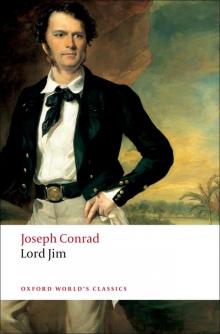 Lord Jim
Lord Jim The Nigger of the Narcissus (Echo Library)
The Nigger of the Narcissus (Echo Library) Victory (Dover Thrift Editions)
Victory (Dover Thrift Editions) Secret Agent
Secret Agent Nostromo
Nostromo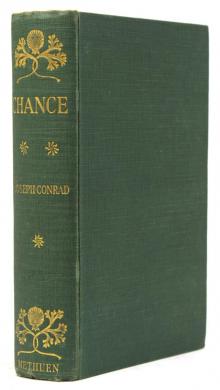 Chance: A Tale in Two Parts
Chance: A Tale in Two Parts Youth
Youth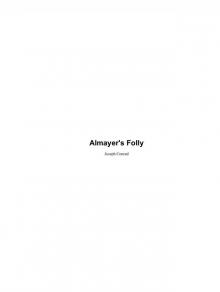 Almayer's Folly
Almayer's Folly The Heart of Darkness and the Secret Sharer
The Heart of Darkness and the Secret Sharer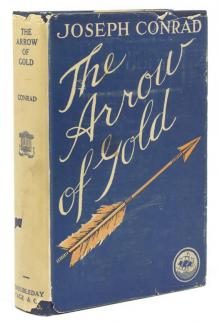 The Arrow of Gold: A Story Between Two Notes
The Arrow of Gold: A Story Between Two Notes The Rescue: A Romance of the Shallows
The Rescue: A Romance of the Shallows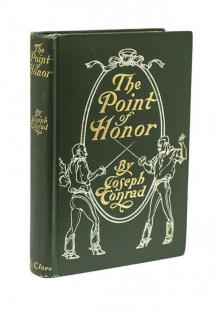 The Point Of Honor: A Military Tale
The Point Of Honor: A Military Tale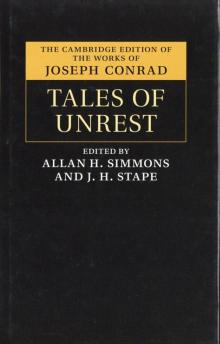 Tales of Unrest
Tales of Unrest Under Western Eyes
Under Western Eyes Gaspar Ruiz
Gaspar Ruiz A Set of Six
A Set of Six Heart of Darkness and the Congo Diary (Penguin Classics)
Heart of Darkness and the Congo Diary (Penguin Classics) Heart of Darkness and Selected Short Fiction
Heart of Darkness and Selected Short Fiction Typhoon
Typhoon Youth, a Narrative
Youth, a Narrative Tomorrow
Tomorrow The Arrow of Gold
The Arrow of Gold The Shadow Line: A Confession
The Shadow Line: A Confession The Rescue
The Rescue Victory (Echo Library)
Victory (Echo Library) The Brute
The Brute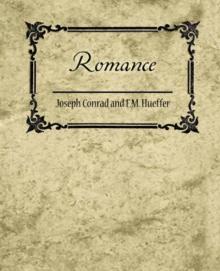 Romance
Romance A Personal Record
A Personal Record Lord Jim: A Tale
Lord Jim: A Tale Heart of Darkness and Selected Short Fiction (Barnes & Noble Classics Series)
Heart of Darkness and Selected Short Fiction (Barnes & Noble Classics Series) Within the Tides
Within the Tides The Secret Sharer and Other Stories
The Secret Sharer and Other Stories Falk
Falk Heart of Darkness and The Secret Sharer
Heart of Darkness and The Secret Sharer Chance
Chance An Anarchist
An Anarchist The Secret Agent: A Simple Tale
The Secret Agent: A Simple Tale The Secret Agent
The Secret Agent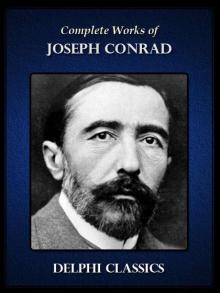 Complete Works of Joseph Conrad (Illustrated)
Complete Works of Joseph Conrad (Illustrated) Heart of Darkness and the Congo Diary
Heart of Darkness and the Congo Diary Notes on Life & Letters
Notes on Life & Letters Typhoon (Single Story)
Typhoon (Single Story)